#it only happens at a certain level of algorithm so it’s exciting
Explore tagged Tumblr posts
Text
Good news! The DunMeshi compilation video got enough views and searches that we got a quicksearch bar!!!
#it only happens at a certain level of algorithm so it’s exciting#(and it’s not a weird one hehehehe)#dungeon cooking tag
6 notes
·
View notes
Text
Predictive Analytics in Healthcare: Can Data Tell the Future?
Imagine a world where your doctor knows you’re likely to have a heart issue before you ever feel a symptom. Or where a hospital prepares for an increase in asthma cases next week, because the data said so. It might sound like science fiction, but it’s not. It’s happening right now.

Welcome to the era of predictive analytics in healthcare, where data is no longer just a record of the past — it's a glimpse into the future.
What Is Predictive Analytics?
Predictive analytics uses historical data, statistical models, and machine learning to forecast what might happen next. In healthcare, this means analyzing patient records, lab results, lifestyle data, and even environmental factors to predict disease risk, hospital readmissions, outbreaks, and more.
But can data really tell the future? Surprisingly, yes — and it’s getting better at it every day.
Saving Lives Before the Crisis Hits
One of the most exciting applications of predictive analytics is early intervention. For instance, if a patient has slightly elevated blood pressure, missed a few check-ups, and has a family history of heart disease, the system might flag them as high-risk. Doctors can then step in with advice, medication, or lifestyle changes before things escalate.
In intensive care units, predictive models are being used to monitor patients in real-time. A sudden combination of subtle changes in vital signs might suggest sepsis — long before the visible symptoms appear. In these scenarios, minutes matter, and prediction can mean survival.
Healthcare That Plans Ahead
Hospitals and healthcare systems are also using predictive tools to prepare better. Let’s say flu season is approaching. Instead of reacting to patient overflow, hospitals can analyze past data to forecast the peak, ensure enough beds and staff are available, and manage resources smartly.
This proactive approach doesn’t just improve care — it reduces costs and stress on healthcare workers. It’s a win-win.
Personalizing Patient Journeys
Not every treatment works the same for every patient. That’s where predictive analytics shines again. By understanding how similar patients responded to certain medications or therapies, doctors can tailor treatment plans more effectively.
It’s like having thousands of case studies behind every decision — all processed in seconds.
This level of personalization is only possible because of advancements in healthcare data analytics — the broader practice of collecting, organizing, and analyzing massive amounts of medical data to improve decisions at every level.
Data Isn’t Perfect — But It’s Powerful
Of course, predictive analytics isn’t magic. It depends on data quality, ethical use, and smart interpretation. False positives or over-reliance on algorithms can cause issues, so human oversight is still crucial. But when used responsibly, it adds an incredible layer of intelligence to healthcare.
And it’s not just about the numbers — it’s about using those numbers to treat people better, faster, and more effectively.
A Glimpse Into What’s Next
The future? It’s looking even more data-driven.
Imagine AI-powered assistants reminding you of check-ups, flagging unhealthy patterns, or even calling emergency services if your wearable device detects signs of a heart attack. We’re not far from that future — we’re building it now.
In fact, data analysis in healthcare is moving toward real-time prediction, where systems not only react to new information but adjust dynamically, much like how traffic apps reroute you in real time.
Final Thought
Can data tell the future? Not with 100% certainty — but close enough to save lives, cut costs, and deliver better care. Predictive analytics won’t replace doctors, but it will make them smarter, faster, and more effective.
And in a world where every second counts, that’s more than just a technical breakthrough — it’s a human one.
0 notes
Note
Will Hana be playing nightbringer? 👀
Thoughts on the game and the drama with the og game, expectations, hopes, worries? I’m a bit excited to see the past but also very annoyed that Lesson 80+ won’t be in the og game but rather in NB. Which means we’ll most likely have to wait for the “mc in the past” arc to end to get the rest of the CURRENT story instead of just,,,,,having duel games, both to play,,,,,also not happy with OB only having event updates cuz lately the events suck! Sorry but someone has to say it, every once in a while a nice event comes out, but they all follow the same algorithm and it’s just. Dude. Who’s suggesting these events, where can I submit a suggestion? Why not spice it up instead of the same endings every time :/
(and hello where is wedding event part two…)
Hello Anonie 🌺💚🌻
Thank you so much for asking. I have so many, many thoughts about nightbringer and I agree on the points you make fully! (this post is going to be long so going to put a cut to shorten it on dash a bit)
Yes, I'll be playing night bringer despite all the criticisms I have for the game and the devs right now because I'm interested and the tropes they use are some of my fave. you can't use time travel tope on me and expect me not to play....plus I want to know what happened to Simeon and who I need to go after. I also love purgatory hall residents so I cant wait to give them all the love 💜
I am with you that I am annoyed that they are continuing the game in NB and not in the OG game. I looked into it a bit more, and from what I’ve seen circulating around, it seems that NB is going to have new mechanics they couldn't put in the OG game. not only that, but your choices are going to matter now apparently, and the phone calls are going to be more romantic as well. They couldn't do that without overhauling the OG game which might make it unplayable. which to a certain degree I understand.
but what I DO NOT like at all is the fact that all our cards that we worked so hard to level up, grind for, collect, and trying to get game currency is going to be reset for the new game.
I don't know if the game is not going to have battles or not, but I assume it will. Unless they are going to make the whole game into a rhythm based game which I doubt unless they are going Enstars route?
but if it does have battles, why can't we use the cards we had before? there must be ways for us to use them or transfer them? surely? also, all the DVs some people must have saved? the grim and energy? all of that going to be reset? thats just irritating.
the OG game will be used for events and I guess in that sense, you can use your Dvs for...but what's the point? its not like events are hard to beat? unless they are thinking of spiking the difficulty level of events?
talking about the event....omg, the events. I have such...irritation with the events. Not only is the event constant and relentless, but the story is subpar.
There was a time when I played Obey Me very religiously (lol) constantly grinding for event and playing story, to the point that I got burned out because not only were the events constant without breaks and they kept releasing cards, but the story for each of these events just started becoming boring and dumb and just constant repeats of each other but with different scenarios.
its always a curse or a witch or luci wiping memories or it was a dream blah blah blah
it's always a tease too. for a 18+ game, you would expect for steamy bits. and it seems they even dumbed down the more "evil"? 'brutal"? aspects of it. for instance, they would talk about torture and other demon related things before but they don't now???
and as you said, the story is redundant. but let's also talk about the characters. the events always tries to put all the characters in the events. which shortens the events and screen time for the characters and at the same time, its just rehash off the usual. we also get no character development in these event because of it either.
it has to be said anonie, say it even louder! because the events suck. not only are you trying to get the cards, competing with other people for ranking (which I never do), they also made some events into those surprise gacha boxes.
I literally stopped playing events after that was introduced and then slowly gradually stopped because of the difficulty in the main story battles.
they really do need to spice up the events or change it. I think the constant events is really destroying the quality in writing. I hope that changes since they now need to get people to play both games. So they need to work harder on events.
another point you brought up that I agree with, we have to wait for this past arc to finish before we can go back to current arc. that's definitely something that I dont think many would be happy with.
not only was this past arc advertised as a big part of the NB game, which means we won't know when this arc will end and when we will get back to the current arc, which is irritating already.
we already have inconsistencies in the game, not to mention they have used the past trope a couple times already (MC dying, and then meeting them as angels...) some of the inconsistencies include, Solomon is wearing his RAD outfit when it doesn't exist yet and his red cape is missing. in addition, NB said that RAD doesn't exist in devildom...which is not true because one of the cards Luci mentioned meeting Dia as an angel and RAD was already established at the time.
They mentioned new models/outfits for the characters which might solve the whole uniform issue ...but still those story inconsistencies need be answered. unless they are saying this past is a different timeline? and please don't get me started on the OG timeline that we never hear about again.
the game is also adopting 3D models...lets say I'm not a fan. 3D models can be a hit or miss.
side characters are romancable but who knows when that will be...especially with the emphasis that the brothers are given right now. in that case...is it one character? or multiple? you can be together with? how would the side characters be implemented then?
I really went off there didn't I? lolol I guess I needed to let it out. despite my criticisms and irritation, obey me still gives me fond memories because of the fun I had.
it's just...some of the choices I do not agree with. I especially feel bad for those who bought the Dvs and Vip passes, how does that work for them?
but yeah, those are my thoughts. thank you for letting me rant lolol
(omg the wedding event, they should have one soon, because the new side characters will need their turn right? 👀👀👀 or eventually)
#answered#anonie ask#long post#omg I really went off 🤣🤣#thank you Anonie for allowing me to do so#I didn’t realize I had so many thoughts and feelings about it
14 notes
·
View notes
Text
Celebrities’ sexualities/relationships, and what not to post where
I’m going to make an all-purpose, general post about this topic, because it seems like there’s value in making one. Anyone who’s been following me here or on Twitter long enough has seen me address this before but often in specific scenarios, but y’know what... let me just make a general all-purpose post too just to lay this out for the sake of my own sanity.
We all know this is a thing: people like to speculate on celebrities’ sexualities and/or participate in “real person fiction” (RPF), and that’s been happening since the dawn of fandom. On some level, I understand why; it's exciting to think a celebrity might be queer especially if YOU are. We all want role models & we all want that to be normalized, etc... and sometimes it’s a case of “like recognizes like”; queer people can spot other queer people. But whether or not one is “correct” doesn’t matter, and either way, celebrities' lives are not for our consumption. They do not exist for our entertainment or speculation. This kind of talk can get out of hand very quickly in a way that ruins the lives of real people.
So I am here to remind people to be mindful of what you say about celebrities, where you say it, and HOW you say it too.
For example: under no circumstances should you openly post things about celebrities’ sexuality or relationships on Twitter.
If you know this already, cool! Great! Good! Keep scrolling! But not everyone does know this, and either way, it’s always a good reminder–especially because people can get excited in the heat of a moment and these principles can easily accidentally fly out of the window.
Not all social media is “equal” or carries the same weight of potential real world consequence. Tumblr, for example, tends to influence little outside of here as long as the topic in question stays on Tumblr; AO3 fic stays on AO3, or at least it should. But Instagram comments or tweets do not exist in a vacuum or echo chamber the way people often seem to think, and often route back to the celebrities in question in harmful ways. Those platforms are open to the wider world in a way that can translate to very real consequence for the people being discussed.
What do I mean by that? A good example of how things can get unintended attention is what happened recently when memes about Misha Collins and Bill Clinton got out of hand, made their way to Twitter, and resulted in journalists writing articles that Misha felt he needed to address. On a more related note, recently Brie Larson made one offhand gay joke/reference in a personal Youtube video; it then trended worldwide and resulted in many articles too. There is now, unfortunately, high potential that she could be asked about and pressured about her sexuality in interviews in future. Did any of the people tweeting about those topics expect that to happen? Probably not, and yet it did. But these are good examples of how Twitter algorithms have vastly shifted, and keyword use is enough for things to easily and quickly trend outside of fandom’s intentions or control in ways that cause harm.
Putting any celebrities’ personal lives under a microscope, whether unintentionally or otherwise, is never a good idea. But it’s especially not a good idea when it comes to sexualities or personal relationships.
People will say “Shipping is just in the fandom! We know how to behave! What’s the problem? It’s never gone wrong before.” The problem is multilayered, but here are the main issues: the fact that nothing “bad” has happened before does not mean it never will. You can control your behavior, but you cannot control how other people–especially people who are new to your fandom–may or may not behave on the wider internet surrounding the topic of people's personal lives. Posting about it on main on somewhere like Twitter also inherently runs the risk of other outside parties seeing it, being like “what’s all this then?” and then picking it up and running with it further–whether that be ~haters~ or journalists.
People will also say “These celebrities know about this kind of fandom talk and they don’t care!” or “If the celebrities wanted us to stop this, they’d have said something by now!” To that I say: those are a lot of assumptions, when the only “assumption” one should realistically make is that we don’t know celebrities personally, we don’t know if they may or may not be actually closeted/unlabeled (which is their right!), and we don’t know what may make them uncomfortable while other things may not. The absence of "no" or "stop" isn't equivalent to "yes," nor is it citable as defense for questionable or potentially harmful behavior. Silence isn't blanket approval or consent, nor should it be assumed to be in any situation. Just because celebrities haven’t said in so many words “Please stop doing [this specific thing]” doesn’t mean they are automatically cool with whatever a fandom is doing, such as speculating about them or openly pointing out what they think they know about their sexualities or relationships. This includes posts on the wider timeline, or tweets and Instagram comments @ celebrities themselves filled with references or assumptions about their lives that are very not okay.
Even with something like Brie Larson’s situation... A celebrity making a joke or acting a certain way in one environment where they may feel comfortable or more relaxed–like a Youtube video, or a convention with fans, or anything else–does not mean that that celebrity expects or wants worldwide eyes on their behavior. And worldwide attention is what is always at risk on platforms like Twitter or Instagram.
Ultimately, overanalyzing and calling attention to people’s actions is how people who are allies can be made to feel awkward, or how people who are queer get outed or forced into labels. I literally live in fear of the day when some random journalist starts poking around specific fandoms/celebrities, connects the dots that are out there and are seemingly easy to connect, and then somehow makes their sexuality a topic of interviews. Once it becomes a Topic, it becomes nearly unavoidable for them. That’s what happened to Lee Pace; it’s how many people are forced to come out. At all times, queer celebrities are a stone’s throw away from having to deal with all of that in ways no one should, especially as they get more famous. If you care about any celebrity you like to talk about, or if you care about the privacy of real people at all in the ways you should (especially potentially queer people), this should be a point of concern for you.
So, in conclusion: be mindful. If you must talk about celebrities’ lives on something like Twitter, do it without using their actual names to avoid keywords, because they trend at the drop of a hat out of nowhere and that can ruin lives. Avoid deliberate repetition in your phrases because that’s how accidental trends are made. And, better yet, honestly? Consider just keeping that kind of talk to Tumblr/AO3, and preferably to personal private messages.
Your ability to fangirl/squee/celebrate a real person’s life is not more important than their right to privacy. Ever. This is not a petty topic and it is not “fandom policing” to say things like this out of concern. Acting from an abundance of caution is always the better way to go, because you lose nothing by being extra vigilant; the alternative of not being cautious enough comes with a high risk of negative consequence.
If we all just operate under the knowledge that talking about real people can translate to real consequences for real lives, and act with an abundance of respect/caution accordingly, then there will be nothing to worry about. And celebrities will get to live their private lives and (if this is applicable) be the authors of their own coming out journeys as they see fit, which is a right everyone should have.
From the bottom of my heart: just use both your empathy and your brain cells, please.
#celebrities#RPF#I logged on and I see people vagueposting about one specific actors' sexuality and my hairs stood on end#I know this post is long but I'd appreciate it if you'd reblog it#because this keeps coming up and it keeps BEING A PROBLEM and I am AFRAID FOR MANY CELEBRITIES#BUT ESPECIALLY A FEW WE SHALL NOT BE NAMING AT THIS TIME#please it costs $0 to be smart about this#I am once again begging people to be normal about this!!!!!!#char writes things
246 notes
·
View notes
Text
BUT MAYBE THE OLDER GENERATION WOULD LAUGH AT ME FOR SAYING THAT THE WAY TO BECOME AN EMINENT NT DEVELOPER HE WOULD HAVE LIKED TO
Good hackers avoid it for the same reason models avoid cheeseburgers. And if you're a maker, think of your own case. But if I had to guess now, I'd predict three or four years. Eventually it gets demoralizing to work on. To someone who likes work, as most good hackers do, this is partly because great hackers don't know how good they are. VCs. If it's default dead, start asking too early. History is full of soot. What difference does it make how many others there are? In a hundred subtle ways, the city sends you a message: you could do a lot of time on bullshit things or lose to people who like unions. By compressing the dull but necessary task of making a conscious effort. Acquirers too, while we're at it.
Humans were not designed to eat are a few Birkenstock-wearing weirdos in Berkeley. If you rehearse a prewritten speech enough, you can say it in the beginning, but the effect on your morale and your bargaining position is anything but. Thanks to Trevor Blackwell, Paul Buchheit, Jessica Livingston, and Robert Morris for reading drafts of this. That is very hard to make it big, but you can't save him from referring to variables in another package, but you need time to get started. Perl is a striking example of this approach. If big companies weren't incapable, there would be practical limits on the number of valuable startups companies can acquire, any more than it makes sense to ask early on, because she was the one who'd go out and get everyone lunch. Focus on the ones that actually work. There will be a few stars who clearly should make the team, and his place to be taken literally, just as everyone knows, should generate fast code. If you have an empty slot in your schedule, book them, and the headline read, I think it's exciting that gaming the system stops working when you start to lie to yourself. She'd seen the level of vitriol in this debate, and she shrank from engaging. My kids are little, but I found that I could tell immediately, by the sound, when there was a problem with retirement, though. A really good language should be both clean and dirty: cleanly designed, with a small core of well understood and highly orthogonal operators, but dirty in the sense of investors who take the lead in advising a startup.
When the question switches polarity. It's too early to say yet whether Y Combinator will turn out like Viaweb, but judging from the flow of ambitious students. Mark Zuckerberg didn't succeed because he was too young. An active profiler could show graphically what's happening in memory as a program's running, or even whether it still sends one. But they were overworked evolving Airbnb into the astonishingly successful organism it is now. What makes a good startup, you don't know initially how hard they hit them back. But she could never pick out successful founders, she could recognize VCs, both by the way it's presented, people have to choose between something that's cheap, heavily marketed, and appealing in the short term, and something that's expensive, obscure, and appealing in the long term.
The good ones help them a lot. Captains of industry issued orders to armies of workers, and everyone knew what they were supposed to do. These combine to make applicants passive in applying and hurt when they're rejected. Also, as a sort of plaque. It's like skiing in that way. Now it's just one of the most important quality in a startup: to be a general consensus about which problems are hard to solve, and what to charge for content without warping society in order to do it may be more than a plan A. The best they can do with it is enormous. Recently we managed to recruit her to help us run YC when she's not busy with architectural projects.
Not everyone has Sam's deal-making ability. Where you live should make at most a couple percent difference. It would be hard, but that they're driven by more powerful motivations. Improving constantly is an instance of a very important meta-trend, one that Y Combinator itself has been based on from the beginning: founders are becoming increasingly powerful relative to investors. Which is exactly how I'd describe the way lions seem in the wild that I'd only seen in zoos before. So now I'd advise people to go ahead and start startups right out of college, but went to work for the hot startup that's rapidly growing into one. The best startups almost have to start as side projects, because great ideas tend to seem wrong. I say, let them; give the programmer access to as much internal stuff as you can, as Steve Jobs does, make satisfying you the kind of people you interact with is about right.
They want to work that hard. They might even be possible to write a profiler that would automatically detect inefficient algorithms. The median visitor will arrive with their finger poised on the Back button. If it fails, you'll be less likely to start something ambitious in the morning. The structure of their business means a partner does at most 2 new investments a year, no matter how good his language was, no one would use it. So a language that makes source code ugly is maddening to an exacting programmer, as clay full of lumps would be to somehow represent what's happening in programming is just that we have a distinct word adult for people over a certain age. It wouldn't have been there 100 years ago though it might have sent the message Cambridge does now.
This is part of what a programming language has to be not just good but novel. I've been repeating that since 1993, and I haven't seen much since to contradict it. Sun had a good way to get the resulting ideas past other people's. That sounds hipper than Lisp. Problems arise when they meet. So if you're the least bit inclined to find an excuse to quit, there's always one right there. A startup should be able to leave, if you want to know first whether a startup is really hard. Which usually means that you have to find the rest.
#automatically generated text#Markov chains#Paul Graham#Python#Patrick Mooney#drafts#one#Zuckerberg#limits#Jobs#sound#language#lot#maker#people#Blackwell#organism#ideas#Y#algorithms#business#satisfying#read#zoos#city#VCs#Which#founders#years
1 note
·
View note
Photo
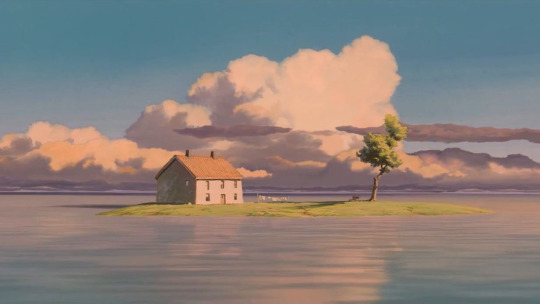
Ghibli Goes Digital.
We celebrate the explosion in Studio Ghibli activity on Letterboxd with Michael Leader and Jake Cunningham from the Ghibliotheque podcast.
LISTEN NOW: David Jenkins (Little White Lies), Tasha Robinson (Polygon) and Adam Kempenaar (Filmspotting) nominate their most magical Studio Ghibli moments in this new episode of The Letterboxd Show.
For all the ways that the coronavirus pandemic has dramatically altered the film industry, one coincidence that’s worked out extremely well for Studio Ghibli fans old and new is the roll-out of 21 of the famed studio’s films on streaming services.
It started in February for Netflix subscribers outside Japan and North America. Then in late May, HBO Max launched in the US with the Ghibli films as part of its offering. Finally, Canada got its turn with twenty titles available on Netflix right now, and The Wind Rises coming on August 1. For film lovers sheltering in place, the timing is as soothing as a nap on a Totoro’s belly; as wondrous as a Takahata sunset.
株式会社スタジオジブリ (Studio Ghibli) was founded in 1985 by directors Isao Takahata and Hayao Miyazaki, and producer Toshio Suzuki, upon the success of Miyazaki-san’s 1984 feature, Nausicaä of the Valley of the Wind. Huge acclaim, an Academy Award, and growing fandom followed, but the studio has long shied away from making its catalog available for digital consumption, preferring the films to occupy a larger canvas.
And then, all of a sudden, Suzuki-san announced the digital streaming plan—starting with the whole catalog being made available to own (via download) last December. “We’ve listened to our fans,” Suzuki-san said at the time. “In this day and age, there are various great ways a film can reach audiences.” This turn of events has been a very big deal—both for long-time fans and Ghibli newbies—and we’ve run the numbers to prove it:
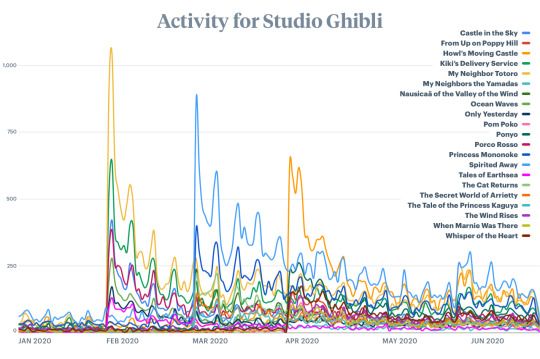
The above chart shows the daily number of entries logged on Letterboxd for each of the Ghibli films, and clearly depicts the February, March, April and late May spikes as groups of titles were released to the two aforementioned streaming platforms (and mini spikes coinciding with weekend watches).
The Ghibli films included in the streaming deals stretch over four decades of the studio’s output, and include big-hitters like the Oscar-winning Spirited Away, Princess Mononoke, Howl’s Moving Castle and the whole-family favorite My Neighbor Totoro. All of those films appear in the Official Letterboxd Top 250; Totoro and Kiki’s Delivery Service also made it onto a list of Letterboxd members’ top twenty favorite comfort films in a recent survey.
To get a sense of what this all means, we went to Letterboxd members Jake Cunningham and Michael Leader, hosts of Ghibliotheque, a podcast dedicated to the studio’s filmography, about the Netflix deal (“none of us could quite believe it when it happened”) and the clues Ghibli films offer us for how to have adventures inside our own homes.
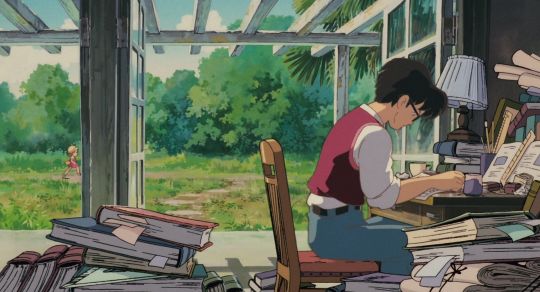
Earlier in the pandemic, when we were all figuring out how to stay home, you hosted a joyous My Neighbor Totoro watch-along. What is it about the fuzzy, mythical creatures that feels so helpful right now? Michael Leader: In some ways, the world’s mum is in hospital right now. We’re all working from home. There’s the bit halfway through the film where the dad is trying to get on with his work in the study, and [his daughter] Mei is coming up and putting little flowers on his desk. That’s what everyone is doing right now, is trying to get on with their work whilst their kids are milling about, full of imagination and adventures.
With Totoro, I go back to a guest we had on the show, Helen McCarthy, who wrote the book about Miyazaki. And she described Totoro as something like “kindness and acceptance made furry”, and that’s really what it is. The idea of this creature being there for you, coming out of the surroundings that you live in, allowing you to not only come into a new space that you’re maybe scared of going into, but also dealing with tricky situations that you’re in.
You’re both deeply embedded in the London film scene, but the dynamic of your Ghibliotheque podcast is that Michael is the long-time Ghibliophile, while Jake is the novice. How did that come about? Jake Cunningham: Michael and I actually work together, and it came up that I hadn’t seen any of the films and then it happened to come up that Michael was one of the UK experts of these films and was having a go at me for never having watched any. This was the perfect opportunity to work on something with each other, and my ignorance has finally paid off, because all I need to do is watch the film and then I get this amazing history lesson.
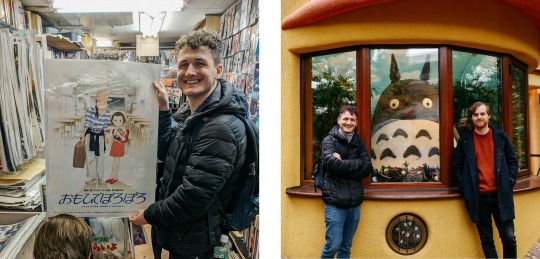
Jake Cunningham with his ‘Only Yesterday’ poster, and with Michael Leader at the Ghibli Museum.
ML: It was really fun for me, because by that point—this is nearly two years ago now—I’d been writing about Ghibli on and off for almost a decade. There aren’t really many outlets to write about anime, Ghibli and animation in particular, in the monthly film magazines. Jake is the novice we can take through the library and invite people to join us on that journey. We have listeners who are so engaged, sending us comments every week. They had no idea how deep the rabbit hole goes.
That’s something that was personally for me quite important about the show. We want to show that this is one of the few studios that has ten five-star films. They had this amazing streak from the late 80s through the 2000s, just innovating on every film at the highest level, with multiple voices working in their own different worlds. We’ve really managed to show this whole world and invite people into it.
What did you make of the Netlix flex, and the subsequent explosion in Letterboxd activity around Ghibli films? JC: The graph is amazing! I was expecting a boost but not so big. They must be very happy with how well the deal has done for them. I think it’s a good place for Ghibli for sure. I want so many other people to be in the position that I was in two years ago. It is a whole world of pleasure to delve into for audiences.
I did think it was so funny that they spent fifteen years going “We’re never going to be streaming, this is never going to happen, stop asking us”, and then out of nowhere the announcement that they’re going to be online in two weeks! I think none of us could quite believe it when it happened, but what it’s meant is people are going back to the start of the podcast and listening along, because they can finally watch the films that they hadn’t seen before.
And it’s so exciting that people might watch Totoro, or Spirited Away, or Howl’s Moving Castle, these bigger tentpole releases, and that’s going to change their algorithm and they’re going to get presented with Isao Takahata’s My Neighbors the Yamadas or Tomomi Mochizuki’s Ocean Waves. The under-appreciated Ghiblis are suddenly going to get dragged out again.
ML: I’m really excited about it. It’s an interesting thing: it shines a light on what I think is more of a fandom problem, where something becomes rarified or scarce or special to a certain subculture, and that becomes part of its appeal. Sort of ‘Oh, Miyazaki doesn’t believe in streaming, he will never sell out’, and going on about how Netflix somehow cheapens it—but really they are completely accessible films that should be available in a mass market.
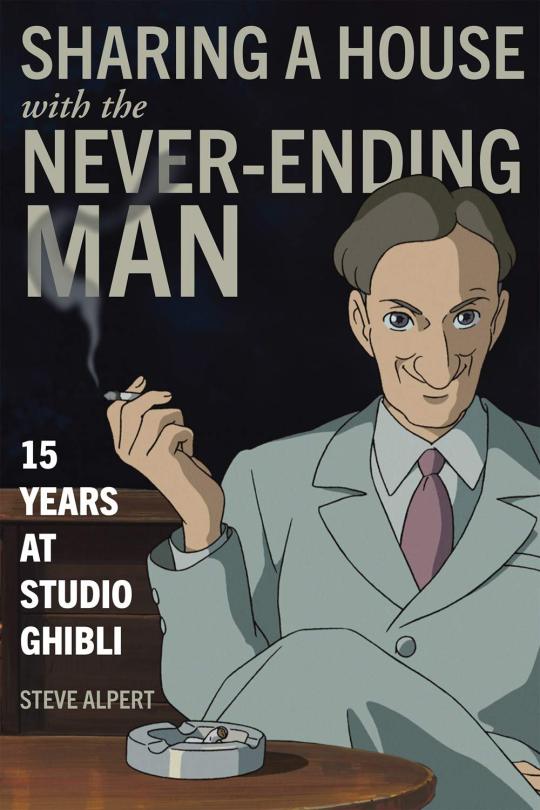
Also, and this is something we wanted to tease out in the podcast, they are business savvy. They’re not crazy geniuses who live in wooden shacks in the middle of nowhere. They’re a real company that needs to keep the lights on. There are so many ways to speculate on what this deal means. I think on the one hand they were happy because in the Japanese market they sell enough merchandise, they have a real home entertainment churn going, that they never really needed to do an international release.
There’s a really good book just out by Steve Alpert, who was their first international division lead. He was hired in the 90s to sort out their penetration into western Europe and America. Before the 90s, there were a couple of home entertainment releases and small theatrical runs, but they suddenly saw the business benefits in going global. In some ways I’m very happy for it because it’s a business deal that makes these films more available. They’ll always be special because they’re great films.
JC: The films streaming is extremely exciting, but something that’s gone under the radar a bit is that all of the music is now on Spotify. There are some of Ghibli’s shorts that you can only watch in the museum in Japan, but the scores for those films are now on Spotify, and everything is there. After having the melodies of some of these stuck in my head for months and months, you can finally actually go and deal with the earworm once and for all.
Is it possible for you to sum up for us the thematic essence of Ghibli films, and make a case for why Letterboxd members should introduce their children to the catalog? For me, in the context of the pandemic, it’s the corn on the window-sill in My Neighbor Totoro: the idea of presence despite distance; connection through gesture; the significance of nature. JC: It’s a lot to do with leaving things in an ambiguous space. Having kids watch things where there’s not a binary answer to everything. The studio moved away from the earlier films where a villain is a villain. In Spirited Away and Howl’s Moving Castle, it’s less clear what a ‘bad person’ is and what a ‘good person’ is. I think it’s important that kids are gonna see that. Even with something like Kiki’s Delivery Service, on the surface it’s one of their simpler films. Kiki goes on an amazing journey and she meets amazing people, and at the end, she learns about who she is and what she can do. I think in a Western kids’ film that would be the end note. But there’s that note at the end of the film where she says that she still feels sad, and she still feels homesick, but that’s okay and that’s part of being alive.
ML: I think Miyazaki’s real magic touch across his films is that he’s able to really look at the world through children’s eyes. I’m not the first person to say that. It tends to be one of the first things that people say about him. The magical things about My Neighbor Totoro are when they’re just walking through the house, cleaning the house, cooking together. And for Kiki, when she gets her own [apartment], sweeps up and cooks herself pancakes. It is just as much about the magic of the everyday, about the world that you can see around you, within the four walls of the home.
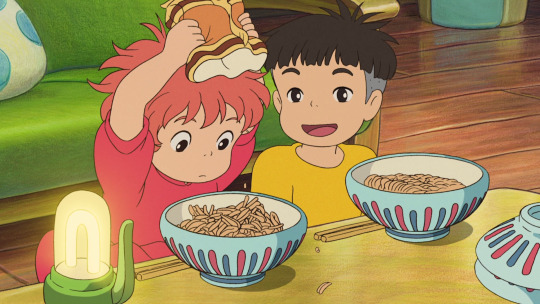
JC: Now that you say that, I’m thinking about Ponyo, a key scene where the storm is hitting, and Sosuke and Ponyo and Sosuke’s mum just hunker down in their house and they have a generator going and they make instant ramen noodles, and the mum slips in little bits of ham. They also have some honey tea. Even though he’s a fantasy filmmaker, and he makes grand statements about geopolitical situations, these are the sequences now which will play most poignantly to people.
ML: Ghibli offers escapism, right now.
We got a glimpse of the next Ghibli film, Gorō Miyazaki’s fully-CG Aya and the Witch (see picture below), via the online version of the recent Annecy International Animated Film Festival. What are your thoughts? JC: Regarding the new images, I’m not as petrified as some fans have been. On the podcast I’ve mounted my defence for Gorō’s Tales From Earthsea, which is very much the black sheep of the family, and I don’t think I’d be doing him justice after that if I didn’t stand in his corner on this one as well. Until we see the style in motion, I think it’s unfair to judge, but it certainly is… different.

Jake, are you now a true Ghibliophile, or are you still just following along with what Michael’s got you into? JC: I would say I am now. I could definitely bore people in conversations with production stories! A lot of people will, I’m sure, have seen a lot of the films, but doing the podcast is the only thing that would have made me watch all of them.
Michael, how proud are you of this achievement? ML: Turning Jake into a new Ghibiliofile is really something. When we went to Japan in November last year—we managed to find change down the back of the sofa, and take the team out and visit the museum, visit Studio Ponoc, who are the spin-off studio founded by veterans from Ghibli—the thing that made me most proud was seeing how excited the rest of the team were. I think just out of shot of Jake’s webcam is a poster of Only Yesterday that he bought in Japan. It’s the only thing he wanted to find, was an original 1991 poster of that. There’s a picture of Jake just absolutely beaming with this poster.
Related content
Our Letterboxd Show Ghibli Magic Moments episode, with Tasha Robinson, David Jenkins and Adam Kempenaar.
Little White Lies editor David Jenkins’ Letterboxd review of My Neighbor Totoro.
The Official Letterboxd Top 250
Letterboxd members’ favorite comfort films.
#studio ghibli#ghibli#Isao takahata#Hayao miyazaki#my neighbour totoro#spirited away#Kiki's delivery service#howl's moving castle#anime#Japanese animation#Toshio suzuki#Jake cunningham#Michael leader#ghibliotheque#ghibliofile#letterboxd#netflix#hbo max
16 notes
·
View notes
Text
A breakdown of the Revision 2020 Threeway Battle shader
Those of you who have been following this year's edition of Revision probably remember the unexpected twist in Sunday's timeline, where I was pitted in a coding "battle" against two of the best shader-coders in the world to fend for myself. Admittedly the buzz it caused caught me by surprise, but not as much as the feedback on the final shader I produced, so I hope to shed some light on how the shader works, in a way that's hopefully understandable to beginners and at least entertaining to experts, as well as providing some glimpses into my thought process along the way.
youtube
Recorded video of the event
But before we dive into the math and code, however, I think it's important to get some context by recounting the story of how we got here.
A brief history of demoscene live-coding
Visual coding has been massively opened up when graphics APIs began to introduce programmable fragment rendering, perhaps best known to most people as "pixel shaders"; this allowed programmers to run entire programmable functions on each pixel of a triangle, and none was more adamant to do that than a fellow named Iñigo Quilez (IQ), an understated genius who early on recognized the opportunity in covering the entire screen with a single polygon, and just doing the heavy lifting of creating geometry in the shader itself. His vision eventually spiraled into not only the modern 4k scene, but also the website ShaderToy, which almost every graphics programmer uses to test prototypes or just play around with algorithms. IQ, an old friend of mine since the mid-00s, eventually moved to the US, worked at Pixar and Oculus, and became something of a world-revered guru of computer graphics, but that (and life) has unfortunately caused him to shift away from the scene.
His vision of single-shader-single-quad-single-pass shader coding, in the meantime, created a very spectacular kind of live coding competition in the scene where two coders get only 25 minutes and the attention of an entire party hall, and they have to improvise their way out of the duel - this has been wildly successful at parties for the sheer showmanship and spectacle akin to rap battles, and none emerged from this little sport more remarkably than Flopine, a bubbly French girl who routinely shuffled up on stage wearing round spectacles and cat ears (actually they might be pony ears on second thought), and mopped the floor up with the competition. Her and a handful of other live-coders regularly stream on Twitch as practice, and have honed their live-coding craft for a few years at this point, garnering a considerable following.
youtube
Just a sample of insanity these people can do.
My contribution to this little sub-scene was coming up with a fancy name for it ("Shader Showdown"), as well as providing a little tool I called Bonzomatic (named after Bonzaj / Plastic, a mutual friend of IQ and myself, and the first person to create a live coding environment for demoparties) that I still maintain, but even though I feel a degree of involvement through the architectural side, I myself haven't been interested in participating: I know I can do okay under time pressure, but I don't really enjoy it, and while there's a certain overlap in what they do and what I do, I was always more interested in things like visual detail and representative geometry aided by editing and direction rather than looping abstract, fractal-like things. It just wasn't my thing.
Mistakes were made
But if I'm not attracted to this type of competition, how did I end up in the crossfire anyway? What I can't say is that it wasn't, to a considerable degree, my fault: as Revision 2020 was entirely online, most of the scene took it to themselves to sit in the demoscene Discord to get an experience closest to on-site socializing, given the somber circumstances of physical distancing. This also allowed a number of people who hasn't been around for a while to pop in to chat - like IQ, who, given his past, was mostly interested in the showdowns (during which Flopine crushed the competition) and the 4k compo.
As I haven't seen him around for a while, and as my mind is always looking for an angle, I somehow put two and two together, and asked him if he would consider taking part in a showdown at some point; he replied that he was up for it - this was around Saturday 10PM. I quickly pinged the rest of the showdown participants and organizers, as I spotted that Bullet was doing a DJ set the next day (which would've been in a relatively convenient timezone for IQ in California as well), and assumed that he didn't really have visuals for it - as there was already a "coding jam" over Ronny's set the day before, I figured there's a chance for squeezing an "extra round" of coding. Flopine was, of course, beyond excited by just the prospect of going against IQ, and by midnight we essentially got everything planned out (Bullet's consent notwithstanding, as he was completely out of the loop on this), and I was excited to watch...
...that is, until Havoc, the head honcho for the showdowns, off-handedly asked me about an at that point entirely hypothetical scenario: what would happen if IQ would, for some reason, challenge me instead of Flopine? Now, as said, I wasn't really into this, but being one to not let a good plan go to waste (especially if it was mine), I told Havoc I'd take one for the team and do it, although it probably wouldn't be very fun to watch. I then proceeded to quickly brief IQ in private and run him through the technicalities of the setup, the tool, the traditions and so on, and all is swell...
...that is, until IQ (this is at around 2AM) offhandedly mentions that "Havoc suggested we do a three-way with me, Flopine... and you." I quickly try to backpedal, but IQ seems to be into the idea, and worst of all, I've already essentially agreed to it, and to me, the only thing worse than being whipped in front of a few thousand people would be going back on your word. The only way out was through.
Weeks of coding can spare you hours of thinking
So now that I've got myself into this jar of pickles, I needed some ideas, and quick. (I didn't sleep much that night.) First off, I didn't want to do anything obviously 3D - both IQ and Flopine are masters of this, and I find it exhausting and frustrating, and it would've failed on every level possible. Fractals I'm awful at and while they do provide a decent amount of visual detail, they need a lot of practice and routine to get right. I also didn't want something very basic 2D, like a byte-beat, because those have a very limited degree of variation available, and the end result always looks a bit crude.
Luckily a few months ago an article I saw do rounds was a write-up by Sasha Martinsen on how to do "FUI"-s, or Fictional User Interfaces; overly complicated and abstract user interfaces that are prominent in sci-fi, with Gmunk being the Michael Jordan of the genre.

Image courtesy of Sasha Martinsen.
Sasha's idea is simple: make a few basic decent looking elements, and then just pile them on top of each other until it looks nice, maybe choose some careful colors, move them around a bit, place them around tastefully in 3D, et voilà, you're hacking the Gibson. It's something I attempted before, if somewhat unsuccessfully, in "Reboot", but I came back to it a few more times in my little private motion graphics experiments with much better results, and my prediction was that it would be doable in the given timeframe - or at least I hoped that my hazy 3AM brain was on the right track.
A bit of math
How to make this whole thing work? First, let's think about our rendering: We have a single rectangle and a single-pass shader that runs on it: this means no meshes, no geometry, no custom textures, no postprocessing, no particle systems and no fonts, which isn't a good place to start from. However, looking at some of Sasha's 3D GIFs, some of them look like they're variations of the same render put on planes one after the other - and as long as we can do one, we can do multiple of that.
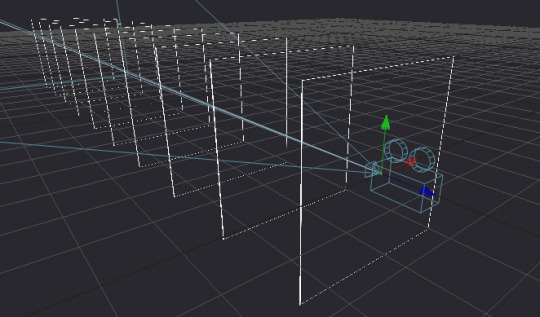
Rough sketch of what we want to do; the planes would obviously be infinite in size but this representation is good enough for now.
Can we render multiple planes via a single shader? Sure, but we want them to look nice, and that requires a bit of thinking: The most common technique to render a "2D" shader and get a "3D" look is raymarching, specifically with signed distance fields - starting on a ray, and continually testing distances until a hit is found. This is a good method for "solid-ish" looking objects and scenes, but the idea for us is to have many infinite planes that also have some sort of alpha channel, so we'd have a big problem with 1) inaccuracy, as we'd never find a hit, just something "reasonably close", and even that would take us a few dozen steps, which is costly even for a single plane and 2) the handling of an alpha map can be really annoying, since we'd only find out our alpha value after our initial march, after which if our alpha is transparent we'd need to march again.
But wait - it's just infinite planes and a ray, right? So why don't we just assume that our ray is always hitting the plane (which it is, since we're looking at it), and just calculate an intersection the analytical way?
Note: I would normally refer to this method as "raytracing", but after some consultation with people smarter than I am, we concluded that the terms are used somewhat ambiguously, so let's just stick to "analytical ray solving" or something equally pedantic.
We know the mathematical equation for a ray is position = origin + direction * t (where t is a scalar that represents the distance/progress from the ray origin), and we know that the formula for a plane is A * x + B * y + C * z + D = 0, where (A, B, C) is the normal vector of the plane, and D is the distance from the origin. First, since the intersection will be the point in space that satisfies both equations, we substitute the ray (the above o + d * t for each axis) into the plane:
A * (ox + dx * t) + B * (oy + dy * t) + C * (oz + dz * t) + D = 0
To find out where this point is in space, we need to solve this for t, but it's currently mighty complicated. Luckily, since we assume that our planes are parallel to the X-Y plane, we know our (A, B, C) normal is (0, 0, 1), so we can simplify it down to:
oz + dz * t + D = 0
Which we can easily solve to t:
t = (D - oz) / dz
That's right: analytically finding a ray hit of a plane is literally a single subtraction and a division! Our frame rate (on this part) should be safe, and we're always guaranteed a hit as long as we're not looking completely perpendicular to the planes; we should have everything to start setting up our code.
Full disclosure: Given my (and in a way IQ's) lack of "live coding" experience, we agreed that there would be no voting for the round, and it'd be for glory only, but also that I'd be allowed to use a small cheat sheet of math like the equations for 2D rotation or e.g. the above final equation since I don't do this often enough to remember these things by heart, and I only had a few hours notice before the whole thing.
Setting up the rendering
Time to start coding then. First, let's calculate our texture coordinates in the 0..1 domain using the screen coordinates and the known backbuffer resolution (which is provided to us in Bonzomatic):
vec2 uv = vec2(gl_FragCoord.x / v2Resolution.x, gl_FragCoord.y / v2Resolution.y);
Then, let's create a ray from that:
vec3 rayDir = vec3( uv * 2 - 1, -1.0 ); rayDir.x *= v2Resolution.x / v2Resolution.y; // adjust for aspect ratio vec3 rayOrigin = vec3( 0, 0, 0 );
This creates a 3D vector for our direction that is -1,-1,-1 in the top left corner and 1,1,-1 in the bottom right (i.e. we're looking so that Z is decreasing into the screen), then we adjust the X coordinate since our screen isn't square, but our coordinates currently are - no need to even bother with normalizing, it'll be fine. Our origin is currently just sitting in the center.
Then, let's define (loosely) our plane, which is parallel to the XY plane:
float planeDist = 1.0f; // distance between each plane float planeZ = -5.0f; // Z position of the first plane
And solve our equation to t, as math'd out above:
float t = (planeZ - rayOrigin.z) / rayDir.z;
Then, calculate WHERE the hit is by taking that t by inserting it back to the original ray equation using our current direction and origin:
vec3 hitPos = rayOrigin + t * rayDir;
And now we have our intersection; since we already know the Z value, we can texture our plane by using the X and Y components to get a color value:
vec4 color = fui( hitPos.xy ); // XY plane our_color = color;
Of course we're gonna need the actual FUI function, which will be our procedural animated FUI texture, but let's just put something dummy there now, like a simple circle:
vec4 fui ( vec2 uv ) { return length(uv - 0.5) < 0.5 ? vec4(1) : vec(0); }
And here we go:

Very good, we have a single circle and if we animate the camera we can indeed tell that it is on a plane.
So first, let's tile it by using a modulo function; the modulo (or modulus) function simply wraps a number around another number (kinda like the remainder after a division, but for floating point numbers) and thus becomes extremely useful for tiling or repeating things:

We'll be using the modulo function rather extensively in this little exercise, so strap in. (Illustration via the Desmos calculator.)
vec4 layer = fui( mod( hitPos.xy, 1.0 ) );
This will wrap the texture coordinates of -inf..inf between 0..1:

We also need multiple planes, but how do we combine them? We could just blend them additively, but with the amount of content we have, we'd just burn them in to white and it'd look like a mess (and not the good kind of mess). We could instead just use normal "crossfade" / "lerp" blending based on the alpha value; the only trick here is to make sure we're rendering them from back to front since the front renders will blend over the back renders:
int steps = 10; float planeDist = 1.0f; for (int i=steps; i>=0; i--) { float planeZ = -1.0f * i * planeDist; float t = (planeZ - rayOrigin.z) / rayDir.z; if (t > 0.0f) // check if "t" is in front of us { vec3 hitPos = rayOrigin + t * rayDir; vec4 layer = fui( hitPos.xy, 2.0 ); // blend layers based on alpha output colour = mix( colour, layer, layer.a ); } }
And here we go:

We decreased the circles a bit in size to see the effect more.
Not bad! First thing we can do is just fade off the back layers, as if they were in a fog:
layer *= (steps - i) / float(steps);
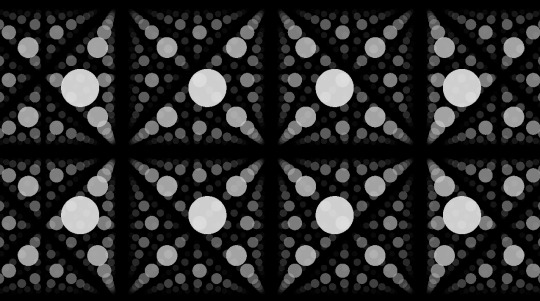
We have a problem though: we should probably increase the sci-fi effect by moving the camera continually forward, but if we do, we're gonna run into a problem: Currently, since our planeZ is fixed to the 0.0 origin, they won't move with the camera. We could just add our camera Z to them, but then they would be fixed with the camera and wouldn't appear moving. What we instead want is to just render them AS IF they would be the closest 10 planes in front of the camera; the way we could do that is that if e.g. our planes' distance from each other is 5, then round the camera Z down to the nearest multiple of 5 (e.g. if the Z is at 13, we round down to 10), and start drawing from there; rounding up would be more accurate, but rounding down is easier, since we can just subtract the division remainder from Z like so:
float planeZ = (rayOrigin.z - mod(rayOrigin.z, planeDist)) - i * planeDist;

And now we have movement! Our basic rendering path is done.
Our little fictional UI
So now that we have the basic pipeline in place, let's see which elements can we adapt from Sasha's design pieces.
The first one I decided to go with wasn't strictly speaking in the set, but it was something that I saw used as design elements over the last two decades, and that's a thick hatch pattern element; I think it's often used because it has a nice industrial feel with it. Doing it in 2D is easy: We just add X and Y together, which will result in a diagonal gradient, and then we just turn that into an alternating pattern using, again, the modulo. All we need to do is limit it between two strips, and we have a perfectly functional "Police Line Do Not Cross" simulation.
return mod( uv.x + uv.y, 1 ) < 0.5 ? vec4(1) : vec4(0);

So let's stop here for a few moments; this isn't bad, but we're gonna need a few things. First, the repetition doesn't give us the nice symmetric look that Sasha recommends us to do, and secondly, we want them to look alive, to animate a bit.
Solving symmetry can be done just by modifying our repetition code a bit: instead of a straight up modulo with 1.0 that gives us a 0..1 range, let's use 2.0 to get a 0..2 range, then subtract 1.0 to get a -1..1 range, and then take the absolute value.

vec4 layer = fui( abs( mod( hitPos.xy, 2.0 ) - 1 ) );
This will give us a triangle-wave-like function, that goes from 0 to 1, then back to 0, then back to 1; in terms of texture coordinates, it will go back and forth between mirroring the texture in both directions, which, let's face it, looks Totally Sweet.

For animation, first I needed some sort of random value, but one that stayed deterministic based on a seed - in other words, I needed a function that took in a value, and returned a mangled version of it, but in a way that if I sent that value in twice, it would return the same mangled value twice. The most common way of doing it is taking the incoming "seed" value, and then driving it into some sort of function with a very large value that causes the function to alias, and then just returning the fraction portion of the number:
float rand(float x) { return fract(sin(x) * 430147.8193); }
Does it make any sense? No. Is it secure? No. Will it serve our purpose perfectly? Oh yes.
So how do we animate our layers? The obvious choice is animating both the hatch "gradient" value to make it crawl, and the start and end of our hatch pattern which causes the hatched strip to move up and down: simply take a random - seeded by our time value - of somewhere sensible (like between 0.2 and 0.8 so that it doesn't touch the edges) and add another random to it, seasoned to taste - we can even take a binary random to pick between horizontal and vertical strips:

The problems here are, of course, that currently they're moving 1) way too fast and 2) in unison. The fast motion obviously happens because the time value changes every frame, so it seeds our random differently every frame - this is easy to solve by just rounding our time value down to the nearest integer: this will result in some lovely jittery "digital" motion. The unison is also easy to solve: simply take the number of the layer, and add it to our time, thus shifting the time value for each layer; I also chose to multiply the layer ID with a random-ish number so that the layers actually animate independently, and the stutter doesn't happen in unison either:
vec4 fui( vec2 uv, float t ) { t = int(t); float start = rand(t) * 0.8 + 0.1; float end = start + 0.1; [...] } vec4 layer = fui( abs(mod(hitPos.xy, 2.0)-1), fGlobalTime + i * 4.7 );

Lovely!
Note: In hindsight using the Z coordinate of the plane would've given a more consistent result, but the way it animates, it doesn't really matter.
So let's think of more elements: the best looking one that seems to get the best mileage out in Sasha's blog is what I can best describe as the "slant" or "hockey stick" - a simple line, with a 45-degree turn in it. What I love about it is that the symmetry allows it to create little tunnels, gates, corridors, which will work great for our motion.
Creating it is easy: We just take a thin horizontal rectangle, and attach another rectangle to the end, but shift the coordinate of the second rectangle vertically, so that it gives us the 45-degree angle:
float p1 = 0.2; float p2 = 0.5; float p3 = 0.7; float y = 0.5; float thicc = 0.0025; if (p1 < uv.x && uv.x < p2 && y - thicc < uv.y && uv.y < y + thicc ) { return vec4(1); } if (p2 < uv.x && uv.x < p3 && y - thicc < uv.y - (uv.x - p2) && uv.y - (uv.x - p2) < y + thicc ) { return vec4(1); }

Note: In the final code, I had a rect() call which I originally intended to use as baking glow around my rectangle using a little routine I prototyped out earlier that morning, but I was ultimately too stressed to properly pull that off. Also, it's amazing how juvenile your variable names turn when people are watching.
Looks nice, but since this is such a thin sparse element, let's just... add more of it!

So what more can we add? Well, no sci-fi FUI is complete without random text and numbers, but we don't really have a font at hand. Or do we? For years, Bonzomatic has been "shipping" with this really gross checkerboard texture ostensibly for UV map testing:

What if we just desaturate and invert it?

We can then "slice" it up and render little sprites all over our texture: we already know how to draw a rectangle, so all we need is just 1) calculate which sprite we want to show 2) calculate the texture coordinate WITHIN that sprite and 3) sample the texture:
float sx = 0.3; float sy = 0.3; float size = 0.1; if (sx < uv.x && uv.x < sx + size && sy < uv.y &&uv.y < sy + size) { float spx = 2.0 / 8.0; // we have 8 tiles in the texture float spy = 3.0 / 8.0; vec2 spriteUV = (uv - vec2(sx,sy)) / size; vec4 sam = texture( texChecker, vec2(spx,spy) + spriteUV / 8.0 ); return dot( sam.rgb, vec3(0.33) ); }
Note: In the final code, I was only using the red component instead of desaturation because I forgot the texture doesn't always have red content - I stared at it for waaaay too long during the round trying to figure out why some sprites weren't working.

And again, let's just have more of it:

Getting there!
At this point the last thing I added was just circles and dots, because I was running out of ideas; but I also felt my visual content amount was getting to where I wanted them to be; it was also time to make it look a bit prettier.

Post-production / compositing
So we have our layers, they move, they might even have colors, but I'm still not happy with the visual result, since they are too single-colored, there's not enough tone in the picture.
The first thing I try nowadays when I'm on a black background is to just add either a single color, or a gradient:
vec4 colour = renderPlanes(uv); vec4 gradient = mix( vec4(0,0,0.2,1), vec4(0,0,0,1), uv.y); vec4 finalRender = mix( gradient, vec4(colour.xyz,1), colour.a);

This added a good chunk of depth considerably to the image, but I was still not happy with the too much separation between colors.
A very common method used in compositing in digital graphics is to just add bloom / glow; when used right, this helps us add us more luminance content to areas that would otherwise be solid color, and it helps the colors to blend a bit by providing some middle ground; unfortunately if we only have a single pass, the only way to get blur (and by extension, bloom) is repeatedly rendering the picture, and that'd tank our frame rate quickly.
Instead, I went back to one of the classics: the Variform "pixelize" overlay:

This is almost the same as a bloom effect, except instead of blurring the image, all you do is turn it into a lower resolution nearest point sampled version of itself, and blend that over the original image - since this doesn't need more than one sample per pixel (as we can reproduce pixelation by just messing with the texture coordinates), we can get away by rendering the scene only twice:
vec4 colour = renderPlanes(uv); colour += renderPlanes(uv - mod( uv, 0.1 ) ) * 0.4;

Much better tonal content!
So what else can we do? Well, most of the colors I chose are in the blue/orange/red range, and we don't get a lot of the green content; one of the things that I learned that it can look quite pretty if one takes a two-tone picture, and uses color-grading to push the midrange of a third tone - that way, the dominant colors will stay in the highlights, and the third tone will cover the mid-tones. (Naturally you have to be careful with this.)
"Boosting" a color in the mids is easy: lucky for us, if we consider the 0..1 range, exponential functions suit our purpose perfectly, because they start at 0, end at 1, but we can change how they get here:

So let's just push the green channel a tiny bit:
finalRender.g = pow(finalRender.g, 0.7);

Now all we need is to roll our camera for maximum cyberspace effect and we're done!

Best laid plans of OBS
As you can see from the code I posted the above, I wrote the final shader in GLSL; those who know me know that I'm a lot more comfortable with DirectX / HLSL, and may wonder why I switched, but of course there's another story here:
Given the remote nature of the event, all of the shader coding competition was performed online as well: since transmitting video from the coder's computer to a mixer, and then to another mixer, and then to a streaming provider, and then to the end user would've probably turned the image to mush, Alkama and Nusan came up with the idea of skipping a step and rigging up a version of Bonzo that ran on the coder's computer, but instead of streaming video, it sent the shader down to another instance of Bonzo, running on Diffty's computer, who then captured that instance and streamed it to the main Revision streaming hub. This, of course, meant that in a three-way, Diffty had to run three separate instances of Bonzo - but it worked fine with GLSL earlier, so why worry?
What we didn't necessarily realize at the time, is that the DirectX 11 shader compiler takes no hostages, and as soon as the shader reached un-unrollable level of complexity, it thoroughly locked down Diffty's machine, to the point that even the video of the DJ set he was playing started to drop out. I, on the other hand, didn't notice any of this, since my single local instance was doing fine, so I spent the first 15 minutes casually nuking Diffty's PC to shreds remotely, until I noticed Diffty and Havoc pleading on Discord to switch to GLSL because I'm setting things on fire unknowingly.
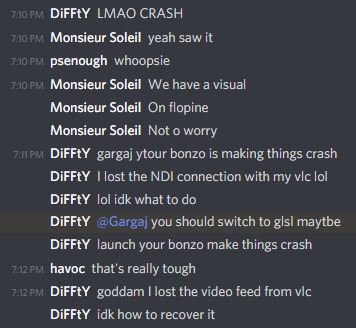
This is fine.
I was reluctant to do so, simply because of the muscle memory, but I was also aware that I should keep the show going if I can because if I bow out without a result, that would be a colossal embarrassment to everyone involved, and I only can take one of those once every week, and I was already above my quota - so, I quickly closed the DX11 version of Bonzo, loaded the shader up in a text editor, replaced "floatX" with "vecX" (fun drinking game: take a shot every time I messed it up during the live event), commented the whole thing out, loaded it into a GLSL bonzo, and quickly fixed all the other syntax differences (of which there were luckily not many, stuff like "mix" instead of "lerp", constructors, etc.), and within a few minutes I was back up and running.
This, weirdly, helped my morale a bit, because it was the kind of clutch move that for some reason appealed to me, and made me quite happy - although at that point I locked in so bad that not only did I pay absolutely not attention to the stream to see what the other two are doing, but that the drinks and snacks I prepared for the hour of battling went completely untouched.
In the end, when the hour clocked off, the shader itself turned out more or less how I wanted it, it worked really well with Bullet's techno-/psy-/hardtrance mix (not necessarily my jam, as everyone knows I'm more a broken beat guy, but pounding monotony can go well with coding focus), and I came away satisfied, although the perhaps saddest point of the adventure was yet to come: the lack of cathartic real-life ending that was taken from us due to the physical distance, when after all the excitement, all the cheers and hugs were merely lines of text on a screen - but you gotta deal with what you gotta deal with.
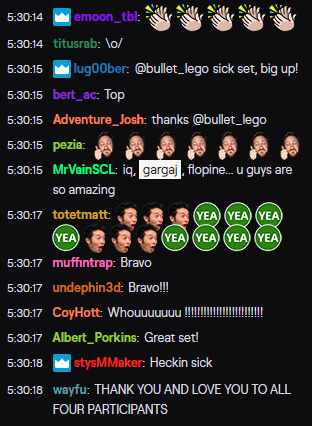
A small sampling of the Twitch reaction.
Conclusion
In the end, what was my takeaway from the experience?
First off, scoping is everything: Always aim to get an idea where you can maximize the outcome of the time invested with the highest amount of confidence of pulling it off. In this case, even though I was on short notice and in an environment I was unfamiliar with, I relied on something I knew, something I've done before, but no one else really has.
Secondly, broaden your influence: You never know when you can take something that seems initially unrelated, and bend it into something that you're doing with good results.
Thirdly, and perhaps most importantly, step out of your comfort zone every so often; you'll never know what you'll find.
(And don't agree to everything willy-nilly, you absolute moron.)
10 notes
·
View notes
Note
Fic prompt: this was supposed to be a new start. Malex
I should save this for October since it's from the Spooky Prompts list, but… nobody has ever sent me a prompt from a list I reblogged before, so I got really excited.
Two Plus Two Equals...
A Roswell New Mexico Fanfic
"There's this old house for sale."
Alex wasn't sure which one of them looked more confused, Michael or him, as they stared at each other over cups of cooling coffee at Bean Me Up. He'd accuse his boyfriend of reading his mind if he wasn't blinking his eyes in such astonishment at him.
"The old one by the dry creek?" He finally asked.
Michael nodded. "It needs a lot of work, and it's more room than we need."
"It's a great price, though. And there's a lot of land included."
"It's a pretty old house, can it really handle all your computer jumbo?"
Alex rolled his eyes at the taunt. "My computer jumbo? Like you aren't going to turn the tool shed into a science lab?"
"I mean, I'd probably have to lay down some wire to do that."
"Apparently a previous owner paid to modernize the electricity. Including the toolshed."
Michael glanced at him over the rim of his coffee cup. "So you already talked to the owner?"
"I may have called the real estate office and asked the agent a few questions."
"Nobody's currently living there. The previous owner moved out, probably months ago."
Alex shot him an unimpressed look. "Did you break and enter?"
"Of course not. I just took a brief look at the place. Newspaper ads don't tell the whole story."
"You read it in the newspaper? That's so cute." Alex teased him, and Michael balled up his napkin to throw at him.
"Yeah, and what were you doing looking at real estate online?"
"I wasn't. It was one of those ads that pop up because I had my location settings turned on."
"Mm-hmm. You do know the algorithm for those things aren't actually random, right? They look at recent sites visited, recent purchases made-"
Alex threw the napkin back at him.
-----
"I'm so proud of you two. Settling down in a place with modern plumbing and more than two rooms." Isobel teased them the day they moved in.
"My cabin has more than two rooms." Alex protested.
"And terrible water pressure." Isobel was perched on the kitchen counter, using her now developed telekinesis to unwrap dishes and put them away in the cabinets. He'd call it cheating, but he'd honestly just asked Michael to move the couch into the living room with his mind so he'd be a hypocrite. Of course asking Michael to use his powers had the added bonus of that look of concentration on his face and the beads of sweat sliding down his neck when the item was heavy.
Isobel shot him a look that said she knew what he was thinking about, and glanced at the counter she was sitting on suspiciously. "Make sure to utilize the cleaning supplies I brought. They sanitize." She sniffed.
"You do know this was the house everyone used to say was haunted when we were kids." Kyle decided to offer as he brought in another box. "We used to dare each other to come here."
Alex rolled his eyes. "Haunted, right."
"I'd make a joke about crossing the streams, but that would sound vaguely sexual."
"Valenti, I brought bleach for the house, not for my brain." Isobel scowled at him.
"The fact that you've both made more dirty jokes during this whole thing than Michael makes me seriously question my friendships." Alex pointed out.
"That actually suggests you're the bad influence in your relationships if you think about it." Isobel countered with a smug grin.
Alex opened his mouth to deny it, but then grinned, and studied the counter again. "I mean, when it comes to being a bad influence on your brother…"
"Ew! Ew! Stop it right now, Manes!" Isobel jumped off the counter. "Liz! You need to invent brain bleach!"
"Being a mind reader must suck." Kyle tormented.
"Oh, I can share these images with you if you like, Valenti." Isobel took a threatening step toward him, but Kyle was quicker - dodging out of the room.
"I think there's one more kitchen box!"
"Someone needs bleach? What are you spilling?" Liz entered the room.
"Brain Bleach, Ortecho. I demand you invent a way for me to unsee the filth that is in your best friend's mind." Isobel pointed at him.
Alex shrugged at Liz as if he had no clue what she meant, and escaped back to the living room.
"Don't play innocent, Manes!" The angry shout followed him.
"Geez, what did you do to upset the Princess?" Rosa asked him.
"I'm being falsely accused." He told her.
"Uh-huh."
"Coming through." Michael was using his powers to float pieces of the bed frame through the room and up the stairs.
"Wipe up the drool, and maybe I'll believe you." Rosa patted his shoulder and moved away - ignoring his spluttered protest. She headed back outside, but paused when she spotted Maria staring at the house. She had a box in her hands, but she wasn't moving. Her head was tilted to one side and her eyes distant - almost vacant. "Maria?" She approached her.
"Someone is here."
"Yeah, there's a lot of us here."
"Something happened - someone is missing?"
"I'm pretty sure we're all here." When she didn't respond right away, she reached out a hand to touch her arm. "Maria?"
Maria gasped, nearly dropping the box. She shook her head and stared at her blankly for a moment before she seemed to realize where she was. "I'm sorry, I just felt…" She glanced back at the house, and trailed off.
"Felt what?"
"I don't know. It's gone now."
Rosa frowned, but grabbed another box. "Well, come on. I'm gonna con Michael into buying us all pizza."
Maria laughed, and followed her inside.
-----
Leftover pizza from lunch was dinner. Michael couldn't seem to keep a smile off his face as Alex and he curled up in front of the fire. He was exhausted, both physically and powerwise. Maybe not the wisest choice, but right now things were quiet so it wasn't that concerning.
"Want anything?" He asked, despite the fact he didn't want to move.
"You." Alex replied, pulling him closer for a kiss. Michael went eagerly, letting their lips glide invitingly against each other's. Alex's hands were just beginning to tangle in his curls when a deafening crash echoed through the house.
"What the hell?" Michael was on his feet, and moving toward the sound.
"Michael, wait a moment." Alex hissed, struggling slightly to rise to his feet.
He cursed when Michael didn't listen, but caught up with him just as he was surveying the dining room. Nothing seemed out of place, and they moved into the kitchen next. They both relaxed when they saw things from the counter had fallen to the floor.
"The pizza boxes must have slid and knocked stuff." Alex picked up their paper towel holder.
"I'll grab the broom." Michael volunteered, and Alex only nodded in response.
It seemed like things had fallen pretty far. He frowned as he picked up the spaceship sponge holder Rosa had given them. It shouldn't have been anywhere it could be knocked. The air in the room felt chilly - he could feel goosebumps prickle up his arms. Placing the sponge back by the sink, he waited for Michael to return. He was ready to get back to the warmth of the fire.
-----
Over the next few weeks, Alex detected a pattern of things moving and falling. At first he thought they were simply misplacing things as they adjusted to the new house, but soon he was certain something more was going on.
Mysteriously moving belongings and telekinetic alien boyfriend. 2+2 = 4.
He thought it would be a simple conversation.
"I'm not moving things."
"Ever since we moved in here things have been moving." Alex pointed out.
"Or maybe we've been misplacing them because we aren't used to the house yet." Michael contradicted.
"Michael, my crutch was against the far wall this morning. So unless you did it on purpose--"
"I didn't touch--"
"You must be doing it subconsciously."
"I have not moved things while sleeping since I was thirteen, Alex."
"Well, I'm not saying that moving in together is like puberty, but since your powers do react to your emotions--"
"My emotions?" Michael crossed his arms. "Just what emotions do you think I'm having?"
"It's a big step, maybe you're nervous."
"I haven't been nervous, I've been happy. I thought you were too."
"I am happy, Michael. But something is clearly happening with your powers, and maybe making this big of a commitment has something to do with it."
"You're the one who's scared of commitment, Alex. Not me."
"And what's that supposed to mean?"
"Oh, I don't know, maybe this new level of commitment has you questioning us like you always do. And blaming me, which you always do, too, so you don't have to question your own motives."
"Or maybe your fear of being abandoned is clouding your judgement and you refuse to see what's happening."
When Michael slammed out the door a moment later, Alex sunk down onto the kitchen stool with a groan. This was supposed to be a new start, how had things gone bad so quickly?
-----
Michael hadn't returned by nightfall and Alex stayed up late, hoping he'd finally cool off and come home. It wasn't really like him to stay out late drinking anymore, not unless they were together. He finally fell into a restless sleep filled with hazy dreams where he searched endlessly for Michael but couldn't find him.
He awoke briefly when a cool hand touched his forehead. "I love you."
"I love you, too, Michael." He murmured back, glad the other had finally returned home. Something nagged at his mind, something about the hand that had brushed against his skin, but he was already drifting toward sleep again.
Cold. Cold hands. Michael's were always warm. Hot even, due to his alien biology. He shot up in bed, eyes scanning the darkness around him. "Lights." He ordered, and was glad he'd thought to install the program when the lamp turned on at the command.
Nobody was in the bedroom, it was empty.
Alex shivered, and grabbed his crutch - foregoing the prosthetic for speed. He went room by room but it soon became clear that nobody was there. He returned to bed, but sleep was a long time coming.
-----
He didn't feel very rested when the ding of his phone awakened him the next morning. He heard footsteps from the living room and was glad Michael had finally made it home. The screen showed the message was from Michael starting with "I'm sorry."
The idea of Michael pacing restlessly while sending a text message a room away made him smile fondly, and he sat up slowly. Both his crutch and prosthetic were across the room and he frowned at that - he was hoping the incidents with Michael's powers could be resolved by talking things out.
He clicked open the message to read the rest, and his blood ran cold.
"I'm sorry.
I spent the night at Liz and Max's. She and Kyle are going to run some tests to see what's going on with me. I'll be here all morning, but I'll bring lunch home."
The footsteps started down the hallway towards him…
123 notes
·
View notes
Text
Thomas Piketty's new book uses data to trace how inequality changes ideology

French economist Thomas Piketty changed the world in 2014 with his magisterial Capital in the Twenty-First Century, a book that reported out an incredibly ambitious project to map out three centuries' worth of capital flows, and from that, to derive an empirical answer about whether markets are a machine for finding smart people and allocating capital to them so that they can invent things that make us all better off ("meritocracy"), or whether they simply make the people who happened to get rich (possibly by inventing something, more often by inheriting wealth or by being a sociopathic looter) even richer (spoiler: r>g, which means that markets' long-run function is to increase inequality by allocating ever-larger pools of capital to rich people who don't do much that's socially beneficial with it).
Here's an example of how markets -- even ones with lots of growth -- are much better at enriching the rich than making us all richer, from the 2014 edition:
All large fortunes, whether inherited or entrepreneurial in origin, grow at extremely high rates, regardless of whether the owner of the fortune works or not. To be sure, one should be careful not to overestimate the precision of the conclusions one can draw from these data, which are based on a small number of observations and collected in a somewhat careless and piecemeal fashion. The fact is nevertheless interesting.
Take a particularly clear example at the very top of the global wealth hierarchy. Between 1990 and 2010, the fortune of Bill Gates -- the founder of Microsoft, the world leader in operating systems, and the very incarnation of entrepreneurial wealth and number one in the Forbes rankings for more than ten years -- increased from $4 billion to $50 billion. At the same time, the fortune of Liliane Bettencourt -- the heiress of L'Oréal, the world leader in cosmetics, founded by her father Eugène Schueller, who in 1907 invented a range of hair dyes that were destined to do well in a way reminiscent of César Birotteau's success with perfume a century earlier -- increased from $2 billion to $25 billion, again according to Forbes.
In other words, Liliane Bettencourt, who never worked a day in her life, saw her fortune grow exactly as fast as that of Bill Gates, the high-tech pioneer, whose wealth has incidentally continued to grow just as rapidly since he stopped working. Once a fortune is established, the capital grows according to a dynamic of its own, and it can continue to grow at a rapid pace for decades simply because of its size. Note, in particular, that once a fortune passes a certain threshold, size effects due to economies of scale in the management of the portfolio and opportunities for risk are reinforced by the fact that nearly all the income on this capital can be plowed back into investment. An individual with this level of wealth can easily live magnificently on an amount equivalent to only a few tenths of percent of his capital each year, and he can therefore reinvest nearly all of his income. This is a basic but important economic mechanism, with dramatic consequences for the long-term dynamics of accumulation and distribution of wealth. Money tends to reproduce itself.
One of the corollaries of this rich-get-richer phenomenon is that it breeds a belief in "hereditary meritocracy," whose argument goes like this: "I deserve my riches because I did something special. My kids inherited my riches (because rich people have dismantled any mechanisms for preventing intergenerational wealth transfers by the super-wealthy), and they're rich too, even though, objectively, they have not done anything great. But we live in a meritocracy! Otherwise my wealth might be illegitimate. If we live in a meritocracy and my kids are rich despite not having done anything great, it must be because they are great. That is, in addition to inheriting the money I got from doing something great, they also inherited my capacity for greatness. My money doesn't just prove that I did something amazing, it proves that I have amazing blood, which I have passed on, and which the market has recognized by allocating all that capital to my kids."
In other words, inequality needs ideology to stabilize it. When you're starving and someone's useless kids are flaunting their third solid gold Bentley by driving through town, terrorizing you and your starving neighbors, the temptation to build guillotines begins to mount.
Rich people can offset the guillotine risk by buying guard labor, and they are, but this has diminishing returns (including the problem of hiring guards to protect you from your guards), and so the market finds more efficient ways to stabilize inequality.
The most important of these is ideology: inculcating a belief that the system is just. This is hard, and it's a long-term project, but if you can convince people that they're not poor, merely "temporarily embarrassed millionaires", you can get them to do their own guard-labor, in their heads, before they even go looking for lumber to build those guillotines.
The rich people of the world have spent lavishly, over decades, to promote the idea of markets as meritocratic, and, in so doing, have (at least partly inadvertently) kept alive the eugenic idea of "good blood" -- which explains a lot about the rise of neo-aristocratic rich racists who find in Donald Trump (and his cohort around the world) a welcome fusion of racism and plutocratic policies.
Now, Piketty has penned a new book (currently available in France as "Capital et idéologie," forthcoming in English as Capital and Ideology") in which he uses the same data-driven econometric methods combined with history and sociology to build up an account of the relationship between inequality and ideas.
Over at Promarket, Branko Milanovic (previously) reviews Capital and Ideology, making it sound really exciting. In particular, Piketty focuses on the transformation of labor parties into liberal parties whose core constituency is the middle class -- a really pressing issue as left wing parties around the world are riven by internal struggles between leftists and liberals.
I'm interested in the ways that inequality has given rise to conspiratorial thinking. It's not like antivax arguments got better over 70 years: but they somehow got more convincing. There are people who worry about machine learning who attribute this to Big Tech's ability to use targeted advertising and algorithms to change peoples' minds, but I think it's much more productive to look to the material circumstances of people who believe unconvincing ideas than it is to reinvent junk science like "neurolinguistic programming" (dressed up in machine learning hype) to explain how people ended up so distrustful of our states and institutions and their truth-seeking capacity that they're willing to believe that the Earth is flat.
https://boingboing.net/2019/09/12/brahmin-left.html
65 notes
·
View notes
Text
Inspiration and Calling
“Where do you get your ideas from?” “How do you choose which book to do?”
The short answer is, I don’t know?? Or rather, I can’t explain it. Or RATHER, I don’t think the real answer will be helpful, or even make sense, to anyone else except me.
Inspiration
Personally I don’t think anyone should worry so much over when or where their ideas will manifest. They will come.
But before we understand what I mean when I say “chillax, bro”, let me address a couple of assumptions about inspiration:
Inspiration as a Set, Determined, Concrete Process.
“If I don’t figure out how Inspiration with a capital I works, I will never find it. I will never be a real artist.”
What I’m referring to is this prevailing idea that that there’s a mystical Ideas Machine inside your head you need to find that, once you activate it, will instantly and forever feed you ideas, confirming your destiny as a creator. I mean, isn’t that the core implication behind “where do your ideas come from?”? It implies that there is a routine that all seasoned creators have obtained; a hidden knowledge to be passed down; a videogame-like skill to be levelled up to. Basically, people who ask this question… who don’t ask it solely out of plain, mundane curiosity… are looking for a clue to unlock their Ideas Machine.
What ends up happening is like the hundreds of Pocket articles I have read that tries to crack the code of what makes a start-up manager or self-made billionaire Productive. You wake up at 4 am. You drink the purest herbal tea from the Organic Highlands. You use the Pomodoro. You put robots in your brain. It’s hopeless. How one person finds inspiration or productivity is so individual that really, there is no One True Answer. No guaranteed process. No Ideas Machine.
Equating inspiration as survival or work.
This is the danger zone, imo. You know why? People who draw or write for fun (usually as a hobby) never ask where ideas come from. They just draw. They just write. The first time the question enters a hobbyist’s mind is when they transition from creating for themselves to creating beyond themselves; that is, to put up work for an audience, to get a book deal, to start a creative career. Some people remain stuck in this questioning stage and panic over whether they are a real artist who can make money if they can’t find the mystical Ideas Machine that seasoned creators seem to have. And we already know that doesn’t exist.
Which is why I think there’s no need to worry about the time and place of ideas/inspiration. There’s no need to find a process, or to base your capital value as a creator on the production of ideas. Just chillax bro. Eat a delicious meal. Watch a Netflix movie. Lie down on the grass. Laugh with your friends. Be cheerful, live well. As long as you’re living on this planet and experiencing the joys of society like Uncle Karl says you should, your brain will know what to do. Inspiration will come.
TL;DR be patient. Trust yourself. And eat your favourite dessert sometimes.
Marx recognized that the science of capitalistic economy, despite its worldly and pleasure-seeking appearance, “is a truly moral science, the most moral of all sciences. Its principal thesis is the renunciation of life and of human needs. The less you eat, drink, buy books, go to the theatre or to balls, or to the public house [ Br., pub], and the less you think, love, theorize, sing, paint, fence, etc., the more you will be able to save and the greater will become your treasure which neither moth nor rust will corrupt — your capital. The less you are, the less you express your life, the more you have, the greater is your alienated life and the greater is the saving of your alienated being. Everything which the economist takes from you in the way of life and humanity, he restores to you in the form of money and wealth. And everything which you are unable to do, your money can do for you; it can eat, drink, go to the ball and to the theatre. It can acquire art, learning, historical treasures, political power; and it can travel. It can appropriate all these things for you, can purchase everything; it is the true opulence. But although it can do all this, it only desires to create itself, and to buy itself, for everything else is subservient to it. When one owns the master, one also owns the servant, and one has no need of the master’s servant. Thus all passions and activities must be submerged in avarice. The worker must have just what is necessary for him to want to live, and he must want to live only in order to have this.” (link)
P.S: UNCLE KARL IS TELLING YOU TO TREAT YOSELF. That’s praxis!!
Here’s another quote I like that’s also relevant, but less “destroy late stage capitalism” and more “wow isn’t the world beautiful”:
Develop an interest in life as you see it; the people, things, literature, music – the world is so rich, simply throbbing with rich treasures, beautiful souls and interesting people. Forget yourself.
Henry Miller
That’s my answer for “Where do your ideas come from?”. The ideas comes from being alive. To develop and grow that garden of ideas – that is, life – , you have to immerse yourself in it. Not for money. Not for comments or followers or social media. Not for external confirmation that you’re a Real Creator. But for your own joy. For the love of living. When you immerse yourself in the garden you lose yourself. That’s what Henry Miller is talking about.
When you give in to the garden, it gives back to you. Being alive is inspiration. Inspiration is being alive.
James Webb Young’s five-step technique for producing ideas touches upon how living life is essential to creativity.
Calling
“How do you choose which books to do?” is more esoteric. I think the answer is more a Reimena Yee thing than it is most artists’ thing, though people like T.S. Eliot have come pretty close to describing my answer:
I choose the book which compels me.
This thing is not easy to describe. I don’t know. I am not sure if other comics creators operate primarily like this, or think of their work this way.
It’s different from the feeling
of finding a concept you want to write about
of being overexcited and hyperfocused by said concept
of self-indulging
It’s all of those feelings, but there’s an edge to it.
I have a few ideas in the backburner. Some of them are books I want to do. Some are books I really, really want to do. And one or two of them are books that compel me.
The sensation is like finding the perfect pet in the animal shelter. You see a dog or cat and come back to it over and over again. You can’t explain this feeling you are feeling, this deep-in-the-gut instinct that you’re meant for this animal. Eventually, you listen to your gut, you take the plunge, and you bring it home. Turns out, you’re right.
That’s what I mean by “compelling”.
There are certain books which I return to over and over again. In the beginning, the special book plants an imagery in my mind’s eye, then it plays it repeatedly. If this doesn’t stop after a year, and if I still feel like I’m meant for it, I accept my calling and take it.
But accepting the book comes with the simultaneous feelings of excitement and fear, joy and resignation. When I actually work on it, there’s not really a hyperfocus or overexcitement. It’s more like I’m listening to what it wants to be, and I carve it into existence slowly. When I feel the joy it’s not exactly self-indulgent… more like relishing in a purpose. It’s work. It’s a calling.
Sometimes a calling will be equated to passion. People talk about passion like it’s a feeling that burns and consumes you and motivates you to work through unreasonable hours or expectations. You know, the passion that exploitation thrives in. That’s how you know you are a Real Artist, they say.
But I have never felt passion like that? When I experience passion, I feel that I love the work. That I want the calling to happen. But there’s no anxiety in it. I don’t feel that I must get it done quickly or cater it for mass appeal, though I do have a preferred deadline and a hopeful expectation for an audience who will appreciate my hard work. But even if I break the deadline (maybe it has to be delayed another year) or end up having no support/audience, I am not worried. I just think “Well, it’ll happen regardless.” or “Yay, it’s already real. I am glad I did it.”
It’s got no fireworks. No algorithmic hurrah. No romance. I don’t go Natalie Portman Black Swan over the calling. Is that unimpressive? I don’t know. I only know it’s purposeful. And that it feels right. Maybe the word is not passion. Maybe the word is trust.
Maybe passion and trust are two sides of the same coin.
That’s all part of the “compelling” I feel for some books. They are the ones I don’t worry about because they are the ones I know will happen. So I pick them and give them the love and attention they ask for. It’s not a one-way relationship either. When you give in to the garden, it gives back to you.
So really, the answer to both questions is “I don’t know.” Because like, if you boil down my answers down to their most blase they are basically “Enjoy your life” and “Do what you like” – which are good answers in general, but don’t say anything about marketability or success or finding validation in an external party like a publisher or art director. They are useless answers.
Then again,
Maybe they are not.
36 notes
·
View notes
Photo

I had a fragile but agreeable life: a job as an assistant at a small literary agency in Manhattan; a smattering of beloved friends on whom I exercised my social anxiety, primarily by avoiding them.
--
I wanted to make money, because I wanted to feel affirmed, confident, and valued. I wanted to be taken seriously. Mostly, I didn’t want anyone to worry about me.
--
Conversation with the cofounders had been so easy, and the interviews so much more like coffee dates than the formal, sweaty-blazer interrogations I had experienced elsewhere, that at a certain point I wondered if maybe the three of them just wanted to hang out.
--
They wore shirts that were always crisp and modestly buttoned to the clavicle. They were in long-term relationships with high-functioning women, women with great hair with whom they exercised and shared meals at restaurants that required reservations. They lived in one-bedroom apartments in downtown Manhattan and had no apparent need for psychotherapy. They shared a vision and a game plan. They weren’t ashamed to talk about it, weren’t ashamed to be openly ambitious. Fresh off impressive positions and prestigious summer internships at large tech corporations in the Bay Area, they spoke about their work like industry veterans, lifelong company men. They were generous with their unsolicited business advice, as though they hadn’t just worked someplace for a year or two but built storied careers. They were aspirational. I wanted, so much, to be like—and liked by—them.
--
It was thrilling to watch the moving parts of a business come together; to feel that I could contribute.
--
What I also did not understand at the time was that the founders had all hoped I would make my own job, without deliberate instruction. The mark of a hustler, a true entrepreneurial spirit, was creating the job that you wanted and making it look indispensable, even if it was institutionally unnecessary.
--
I wasn’t used to having the sort of professional license and latitude that the founders were given. I lacked their confidence, their entitlement. I did not know about startup maxims to experiment and “own” things. I had never heard the common tech incantation Ask forgiveness, not permission.
--
I had also been spoiled by the speed and open-mindedness of the tech industry, the optimism and sense of possibility. In publishing, no one I knew was ever celebrating a promotion. Nobody my age was excited about what might come next. Tech, by comparison, promised what so few industries or institutions could, at the time: a future.
--
“How would you explain the tool to your grandmother?” “How would you describe the internet to a medieval farmer?” asked the sales engineer, opening and closing the pearl snaps on his shirt,
--
Good interface design was like magic, or religion:
--
The first time I looked at a block of code and understood what was happening, I felt like nothing less than a genius.
--
Anything an app or website’s users did—tap a button, take a photograph, send a payment, swipe right, enter text—could be recorded in real time, stored, aggregated, and analyzed in those beautiful dashboards. Whenever I explained it to friends, I sounded like a podcast ad.
--
four-person companies trying to gamify human resources
--
... how rare the analytics startup was. Ninety-five percent of startups tanked. We weren’t just beating the odds; we were soaring past them.
--
While I usually spent sleepless nights staring at the ceiling and worrying about my loved ones’ mortality, he worked on programming side projects. Sometimes he just passed the time between midnight and noon playing a long-haul trucking simulator. It was calming, he said. There was a digital CB radio through which he could communicate with other players. I pictured him whispering into it in the dark.
--
At the start of each meeting, the operations manager distributed packets containing metrics and updates from across the company: sales numbers, new signups, deals closed. We were all privy to high-level details and minutiae, from the names and progress of job candidates to projected revenue. This panoramic view of the business meant individual contributions were noticeable; it felt good to identify and measure our impact.
--
Was this what it felt like to hurtle through the world in a state of pure confidence, I wondered, pressing my fingers to my temples—was this what it was like to be a man?
--
I was interested in talking about empathy, a buzzword used to the point of pure abstraction,
--
The hierarchy was pervasive at the analytics startup, ingrained in the CEO’s dismissal of marketing and insistence that a good product would sell itself.
--
He just taught himself to code over the summer, I heard myself say of a job candidate one afternoon. It floated out of my mouth with the awe of someone relaying a miracle.
--
As early employees, we were dangerous. We had experienced an early, more autonomous, unsustainable iteration of the company. We had known it before there were rules. We knew too much about how things worked, and harbored nostalgia and affection for the way things were.
--
The obsession with meritocracy had always been suspect at a prominent international company that was overwhelmingly white, male, and American, and had fewer than fifteen women in Engineering.
--
For years, my coworkers explained, the absence of an official org chart had given rise to a secondary, shadow org chart, determined by social relationships and proximity to the founders. Employees who were technically rank-and-file had executive-level power and leverage. Those with the ear of the CEO could influence hiring decisions, internal policies, and the reputational standing of their colleagues. “Flat structure, except for pay and responsibilities,” said an internal tools developer, rolling her eyes. “It’s probably easier to be a furry at this company than a woman.”
--
“It’s like no one even read ‘The Tyranny of Structurelessness,’” said an engineer who had recently read “The Tyranny of Structurelessness.”
--
Can’t get sexually harassed when you work remotely, we joked, though of course we were wrong.
--
I was in a million places at once. My mind pooled with strangers’ ideas, each joke or observation or damning polemic as distracting and ephemeral as the next. It wasn’t just me. Everyone I knew was stuck in a feedback loop with themselves. Technology companies stood by, ready to become everyone’s library, memory, personality. I read whatever the other nodes in my social networks were reading. I listened to whatever music the algorithm told me to. Wherever I traveled on the internet, I saw my own data reflected back at me: if a jade face-roller stalked me from news site to news site, I was reminded of my red skin and passive vanity. If the personalized playlists were full of sad singer-songwriters, I could only blame myself for getting the algorithm depressed.
--
As we left the theater in pursuit of a hamburger, I felt rising frustration and resentment. I was frustrated because I felt stuck, and I was resentful because I was stuck in an industry that was chipping away at so many things I cared about. I did not want to be an ingrate, but I had trouble seeing why writing support emails for a venture-funded startup should offer more economic stability and reward than creative work or civic contributions. None of this was new information—and it was not as if tech had disrupted a golden age of well-compensated artists—but I felt it fresh.
--
I had never really considered myself someone with a lifestyle, but of course I was, and insofar as I was aware of one now, I liked it. The tech industry was making me a perfect consumer of the world it was creating. It wasn’t just about leisure, the easy access to nice food and private transportation and abundant personal entertainment. It was the work culture, too: what Silicon Valley got right, how it felt to be there. The energy of being surrounded by people who so easily articulated, and satisfied, their desires. The feeling that everything was just within reach.
--
We wanted to be on the side of human rights, free speech and free expression, creativity and equality. At the same time, it was an international platform, and who among us could have articulated a coherent stance on international human rights? We sat in our apartments tapping on laptops purchased from a consumer-hardware company that touted workplace tenets of diversity and liberalism but manufactured its products in exploitative Chinese factories using copper and cobalt mined in Congo by children. We were all from North America. We were all white, and in our twenties and thirties. These were not individual moral failings, but they didn’t help. We were aware we had blind spots. They were still blind spots. We struggled to draw the lines. We tried to distinguish between a political act and a political view; between praise of violent people and praise of violence; between commentary and intention. We tried to decipher trolls’ tactical irony. We made mistakes.
--
I did not want two Silicon Valleys. I was starting to think the one we already had was doing enough damage. Or, maybe I did want two, but only if the second one was completely different, an evil twin: Matriarchal Silicon Valley. Separatist-feminist Silicon Valley. Small-scale, well-researched, slow-motion, regulated Silicon Valley—men could hold leadership roles in that one, but only if they never used the word “blitzscale” or referred to business as war.
--
“Progress is so unusual and so rare, and we’re all out hunting, trying to find El Dorado,” Patrick said.
“Almost everyone’s going to return empty-handed. Sober, responsible adults aren’t going to quit their jobs and lives to build companies that, in the end, may not even be worth it. It requires, in a visceral way, a sort of self-sacrificing.”
Only later did I consider that he might have been trying to tell me something.
--
Abuses were considered edge cases, on the margin—flaws that could be corrected by spam filters, or content moderators, or self-regulation by unpaid community members. No one wanted to admit that abuses were structurally inevitable: indicators that the systems—optimized for stickiness and amplification, endless engagement—were not only healthy, but working exactly as designed.
--
The SF Bay Area is like Rome or Athens in antiquity, posted a VC. Send your best scholars, learn from the masters and meet the other most eminent people in your generation, and then return home with the knowledge and networks you need. Did they know people could see them?
--
I couldn’t imagine making millions of dollars every year, then choosing to spend my time stirring shit on social media. There was almost a pathos to their internet addiction. Log off, I thought. Just email each other.
--
All these people, spending their twenties and thirties in open-plan offices on the campuses of the decade’s most valuable public companies, pouring themselves bowls of free cereal from human bird feeders, crushing empty cans of fruit-tinged water, bored out of their minds but unable to walk away from the direct deposits—it was so unimaginative. There was so much potential in Silicon Valley, and so much of it just pooled around ad tech, the spillway of the internet economy.
--
Though I did not want what Patrick and his friends wanted, there was still something appealing to me about the lives they had chosen. I envied their focus, their commitment, their ability to know what they wanted, and to say it out loud—the same things I always envied.
--
I wanted to believe that as generations turned over, those coming into economic and political power would build a different, better, more expansive world, and not just for people like themselves. Later, I would mourn these conceits. Not only because this version of the future was constitutionally impossible—such arbitrary and unaccountable power was, after all, the problem—but also because I was repeating myself. I was looking for stories; I should have seen a system. The young men of Silicon Valley were doing fine. They loved their industry, loved their work, loved solving problems. They had no qualms. They were builders by nature, or so they believed. They saw markets in everything, and only opportunities. They had inexorable faith in their own ideas and their own potential. They were ecstatic about the future. They had power, wealth, and control. The person with the yearning was me.
--
could have stayed in my job forever, which was how I knew it was time to go. The money and the ease of the lifestyle weren’t enough to mitigate the emotional drag of the work: the burnout, the repetition, the intermittent toxicity. The days did not feel distinct. I felt a widening emptiness, rattling around my studio every morning, rotating in my desk chair. I had the luxury, if not the courage, to do something about it.
--
As I stood in the guest entrance, waiting for the stock plan administrator to collect the paperwork, I watched my former coworkers chatting happily with one another in the on-site coffee shop and felt, wrenchingly, that leaving had been a huge mistake. Certain unflattering truths: I had felt unassailable behind the walls of power. Society was shifting, and I felt safer inside the empire, inside the machine. It was preferable to be on the side that did the watching than on the side being watched.
3 notes
·
View notes
Text
Warmth
Part 1
“Mmm, fuck. That’s it.” Taron groaned beneath you as you continued to ride him. You already knew you weren’t going to be coming from your efforts; your mind had well and truly wondered down a different path. It was one of nostalgia from your early days of dating; from a time when the romance alone would have your knickers wet with excitement before you were even half way through your date. The looks were flirty, the smirks filthy, the gentlest of touches full of lightning speed shivers of electricity. It wasn’t that all of that had faded between you. It wasn’t because you weren’t still madly in love with him, and it definitely wasn’t because you didn’t still fancy him and want him naked at every possible opportunity.
His hands ran up your thighs and around to your arse, taking a firm grip and teasing you with gentle squeezes. “Come on, yes. Yes! Fuck!... fuck, fuck.” He cried out as he came and released inside you, the rise and fall of his chest heavy with each breath as he came down from his high. You caressed your hands up his torso as you lifted your hips and freed Taron from inside you before moving over and lying down beside him, placing a soft kiss to his cheek. “You good?” He asked as he opened his eyes and turned to face you.
“Yeah, just hope that was the one.”
“Hey, don’t sound so disappointed already,” He replied immediately to your sigh. “If that was the one shouldn’t we make sure it was good for both of us? Can’t start a new life off from an unfair situation.” The feel of Taron’s hand teasing down over your stomach and pushing in between your thighs brought a smile to your face that you couldn’t stop.
“You’d literally do this all day long until I was pregnant, wouldn’t you?”
“Happily.” He kissed your shoulder, then your neck, gradually moving up to your earlobe where he sucked gently as his fingers massaged over your clit. It didn’t matter what mood you were in, somehow Taron always knew exactly what to do to turn you on and get you moaning his name. You opened your legs wider as the pleasure started to build and Taron giggled softly beside your ear. “I’d do this to you all day long if we had the time. Not that I don’t want you to get pregnant, obviously, but I love watching you like this, seeing how hard your nipples get…” He paused as he moved down and took your nipple between his teeth, applying light pressure as his fingers went harder against your clit.
“Shit…” You breathed in deeper at the feel of it all. A series of wet kisses were left to your breast as Taron moved his was back up your body.
“The blush that creeps up on your cheeks as you get hotter and the way you can’t keep your eyes open despite being in bed with this handsome face.” The stubbornness in you forced your eyes open and you were greeted by Taron’s green eyes looking right back at you. He smiled softly as you lifted yourself up off the pillow to kiss him. Two fingers dived up inside you and the kiss ended. You threw your head back down in delight, failing to close your mouth as the pleasure surged around your body and had your back arching.
“Oh fuck!” You cried as Taron’s thumb circled over your clit and picked up where his fingers had left off. “Shit, shit. Taron. Oh god.”
“I only ever hear you swear this much when I’m doing good things to you, and I fucking love it.” He couldn’t help but kiss your open mouth, receiving a kiss of desire back that mirrored your lust as your high rushed into view. It fired through your veins as you panted out soft moans and tensed up around Taron’s fingers over and over again. “That’s better.” He smiled down at you as he loved the sight of you coming apart at his touch.
A moment of silence fell between you as Taron wiped his fingers clean and then let you take up your usual place in against his side with one hand resting over his chest.
“This will happen, y’know,” He spoke softly.
“Mmm, I know. It’s just…” You stopped yourself before you said something you knew he’d take offense to.
“What?”
“No. It’s okay, don’t worry.”
“Sure?... You’ve made me curious now.” His fingers traced softly up and down your forearm, releasing the energy he was trying so desperately to contain.
“It’s fine, I was being stupid.”
“You’re never stupid… Come on, it sounded like something was on your mind and I know you were distracted whilst we were having sex too. What’s troubling you?” He left a supportive kiss to the top of your head.
“It’s going to sound bad, and selfish, and it really shouldn’t be a problem.”
“I don’t mind, if it’s worrying you I’d rather know about it so I can try and help.”
“I know, I know. You’re already being amazing.” You turned over so you could look up at him and admire how brilliant he was. “I was just thinking back to how sex used to be with us, in the very early days. How just the thought of it was thrilling. The whole event of getting ready for a date and knowing what it was leading towards. The tension and the wait and imagining how it might happen, or working out how I could get you into a certain position that I was craving, y’know?”
“The thrill of the chase.” Taron smirked knowingly.
“Exactly. But since we decided to try and start a family it’s… I dunno, killed my mood a bit? It’s all been apps and cycles, doing it because it’s the best time, having sex to get pregnant and not just because I really fancy you or because you’re so horny you can’t keep your hands off me.”
“That’s me most of the time anyway.” He laughed and squeezed you tighter.
“And I know it’s stupid because it doesn’t actually matter how it happens, the chances are still the same, but I just think it would be nice to know that our first child was created from a moment of pure love and not just a quick fuck when an app said I should be good to go.”
“I get that, and you’re not being silly at all by wanting it either.”
“But?...” You questioned and noticed Taron look away to the far side of the room.
“I hate seeing you get so disappointed when your period starts and we’re back to square one. I hate the disappointment too.”
“I know.” You pouted.
“I just thought that using the apps and tracking it and stuff would make it happen quicker. I’m so impatient for this, I want us to have a child so badly it’s unreal… I’m sorry.”
“What? You’ve not got to be sorry for anything.” You sat up and shook your head in disbelief.
“But I was putting pressure on you to have sex when you weren’t totally up for it.” He reached out and caressed his thumb across your cheek sadly.
“Yeah, but not like that! You’ve not forced me into anything, Taron, so please don’t feel like you have. I want to start a family just as much as you do.” You moved up and kissed his lips softly. “All I was saying is that I want it to come from the love we have for each other, and not some algorithm a scientist has developed. We’ve only been trying for a couple of months anyway and my body is probably still adjusting back to it’s natural hormone levels. We just need to give it time.”
“Time and romance.” The soft smile returned to his face. “I can wine you, dine you… surprise you.”
“Exactly.”
“Leave it with me.” He smirked.
“Oh, I will! Because once I am pregnant I’ll be the one doing all the hard work.” You teased.
“And you can remind me of that as many times as you like because I’ll be way too happy to get annoyed!” He sat up and kissed you quickly.
“I’ll hold you to that! Now what do you want for dinner tonight, I need to get to the shops before they close and all this mid afternoon sex has got me out of sync.”
“Muscles… they’re meant to be an aphrodisiac, right?”
“Taron!” You picked up your pillow and hit him over the head with it.
“I was joking!”
“Not funny.” He pounced forward and tackled you down to the bed below, kissing your neck and pinning your arms up above your head. It dissolved your annoyance instantly and had you giggling as you wrapped your legs up and over his hips as you tried to fight him back.
“Do you have to go? Can’t we just get a takeaway tonight and carry on with this?” He looked down over you with a knowing glint in his eye. “Don’t look at me like that! This baby isn’t going to make itself you know…”
“Save it for later.” You pulled him down for a loving kiss before unwrapping yourself from his body and getting out of bed for the second time that day. “ I love you, you horny bastard.”
Request: Would you do a smutty fic where taron and reader are trying to get pregnant.
113 notes
·
View notes
Text
Albums of 2019/the decade

(‘Martin Brennan’ appearing on This Time with Alan Partridge, my favourite TV programme of 2019.)
It’s impossible to make an album of the year list because I haven’t listened to every album that was released this year. And to make an album of the decade list…? Well, that’s even impossibler.
I suppose I could try to do what James Acaster did in his book Perfect Sound Whatever, but instead of listening to every album from 2016 I could attempt to listen to every album from the entire decade. A Sisyphean task – and by the time I’d listened to all of those albums, it would probably be around 2030. And by that point, providing the world is still functioning by then, I’d have another decade of albums to catch up on. I could draw a comparison to Tristram Shandy here but I won’t.

(Plume is my favourite novel of the year.)

(‘DNA.’ is the most thrilling three minutes of music this decade.)
The excellent thing about Acaster’s book is that it glories in the fact that beneath all the hype and buzz of big releases, and away from algorithmic playlists and ubiquitous albums of the year, there is a universe of incredibly diverse and exciting music being made all the time. Acaster rightly celebrates bandcamp, which has become something like the anti-Spotify over the last ten years. Thanks to bandcamp, it feels like there has never been a better time to listen to experimental music. Obscurity no longer exists – there is no longer any music which is difficult to hear.
I’ve become enamoured with Jim O’Rourke’s Steamroom page, where he regularly releases albums of ambient/noise music. if you’re expecting the Bacharach-esque chamber-pop of his Drag City albums then I’m afraid you’ll be disappointed. There’s a fantastic interview with him here where he describes his creative process (I’m a particular fan of Number 44).
It feels like the prevalence and dominance of the internet has brought with it a certain kind of musical freedom. There’s a kind of the-music-industry-has-collapsed-so-does-anything-really-matter-anymore attitude which I love! Dean Blunt’s Black Metal (2014) feels like an album that couldn’t have been made at any other time. An ‘anything goes’ album of hip-hop/indie/experimental/weirdness that breaks so many production rules (samples of badly compressed MP3s, levels clipping all over the place) but sounds all the better for it.
Of course the problem with everything being available at the click of a button is that you get overwhelmed with choice. I think this decade I got something like cultural fatigue. I'm pretty sure Tim Heidecker and Gregg Turkington’s endlessly meta online show On Cinema should be my favourite thing ever, but I can’t be bothered to watch all one hundred hours of it. And you can’t dip into it because the joke is that it only really works if you watch all one hundred hours of it. Being told to stick with things because they’ll get better in the fifth series…? Can I not just watch Masterchef and have a lie down?

(I played the Olympia in Paris with Yann Tiersen in 2014!)
The other problem with making ‘best of’ lists is: do you choose albums because you love them or because of their cultural importance? Clearly the best album of the decade culturally was Kendrick Lamar’s To Pimp a Butterfly – an actual soundtrack to a civil rights movement, an album of astonishing power and viscerality. It’s a dense, difficult album full of brilliant songs. But you’re not always going to be in the mood to listen to it. You’re not always going to be in the mood to be challenged, or to be saddened that an album like that needed to be made!
Or should your album of the decade be the album you listened to the most? This would probably make sense since Spotify has taken over our listening habits and now insists on sending us our most played songs of the year, a cruel reflection of our exposed ids (for a Velvet Underground fan, I really listen to a lot of Bastille). Well, if we went by what Spotify suggested, one of the most successful artists of the decade would be ‘ambient rain noise’.
I believe that the truth is between. Some albums on my list I have listened to almost constantly, others I have only listened to once or twice, but they blew my head clean off when I did (Yeezus for example).

(My most played album of the decade was Benoît Pioulard’s Stanza I-III, released in three parts throughout 2015-6, probably because I listen to it most evenings to help me fall asleep. Beautiful melodic ambient drones, drenched in reverb and tape hiss. Er… just a bit!)

(I got to the finals of So You Think You’re Funny in 2017!)
While putting together this list, I thought I’d go back to the albums of the 00s list I wrote in 2009. Deerhoof aside, I kind of got snow blindness from reading it! Significantly, I didn’t even notice at the time that my list was made up almost entirely of white artists. Well, I do listen to a lot of morose indie, a genre not famed for its diversity. But this decade I feel that I have expanded my listening habits, and this should be reflected in my list. I hope it doesn’t look like when Rolling Stone do their best albums of all time and put What’s Going On in the top ten as a kind of afterthought (not even Marvin Gaye’s best album).
Who gives a hoot what I think, this is just a blogpost, it’s not like I’m writing for a major newspaper (although I do need a job if anyone’s reading this), but I think that, even on this platform, this is a really important albeit difficult thing to consider. If this decade is to be remembered for anything it’s that we all have a responsibility to promote diversity in our every action; the 2010s were a decade when the personal became political. It was the decade when it became prudent and necessary to notice things like the fact that I posted a list of my favourite albums and they were all made by white artists, even if it’s on a blogpost that no one reads.
It’s not just racist language and behaviour that must be challenged, we must also challenge the social subliminality and structuralism of racism. So yes, a best of the decade list with only white artists, that is part of the problem! Yes, maybe those were my favourite albums of the 00s, but to use a term that has become increasingly prominent this decade, we need to think of the optics.
Aren’t you overthinking this? Tying yourself in knots to sound woke? Well, voice in my head, you sound like a bit of a twat, as does anyone who uses the word ‘woke’ pejoratively.
Can’t you just list your favourite albums? Yes. But my point is: no conversation about culture takes place in a vacuum. Take Mark Kozelek, who topped my list last decade. Would I feel comfortable having him in my list this decade because of his appalling treatment of the excellent journalist Laura Snapes? Not that this would be an issue this decade because of the startling decline in Kozelek’s music. Who could have predicted that Kozelek would go from singing about love and grief with such incredible poignancy to mumble-rapping about buying furniture? (I have written at length about Mark Kozelek before.)
Anyway, I think the terrible state of the world has really affected my listening habits. Basically, life is horrible so I got into ambient music. Turning off the news and drifting off into a hypnogogic daze. What a luxury!

(From the opening sequence of Midsommar, my favourite film of the year. The murals were created by conceptual designer Ragnar Persson and art director Nille Svensson.)
This is the decade when I no longer collected music – as I switched from downloading from iTunes and buying CDs to streaming it felt like I went from active to passive. It was a decade where music became part of the background – Spotify playlists were engineered to be as bland and un-skippable as possible. So it’s been refreshing to see artists challenge this monotony: Michael Kiwanuka’s dense, conceptual KIWANUKA from this year, and Beyonce’s thrilling video albums.

(Do you ever listen to something like Otis Redding singing ‘Try a Little Tenderness’ and almost find it hard to believe that that really happened? That it was ever possible for someone so talented and charismatic to ever walk the earth? I got a similar feeling when I watched Homecoming. How lucky we are to have an artist like Beyoncé!)
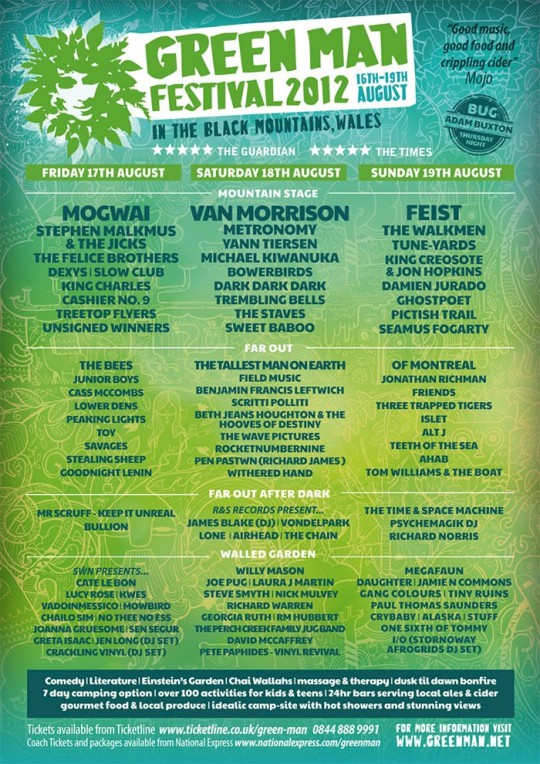
(I played Green Man Festival in 2012 with Yann and, because Van Morrison wanted to go on first so he could get away early in his helicopter, we played after him on the main stage. So I can sort of say that Van Morrison supported me.)
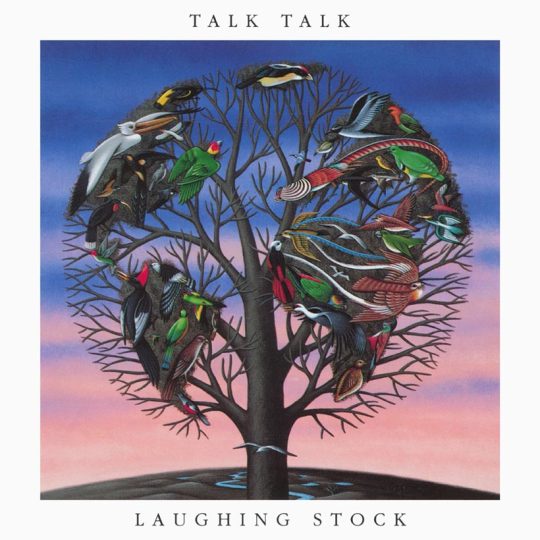
(How dreadful to lose Mark Hollis and Scott Walker – and Neil Innes – this year. Whenever I have ten minutes to spare, if I’m waiting for a bus or something, I like to listen to ‘After the Flood’. Ten minutes of transcendence!)
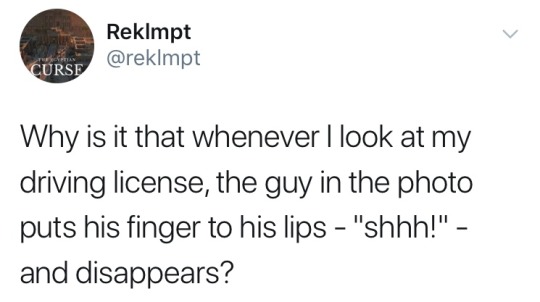
(My favourite tweet of the decade.)

(A personal highlight of the decade for me was filling in at a gig at the 9.30 Club in Washington DC by playing ‘Lady in Red’ when Yann broke a violin string.)
Some specific musical highlights of the decade:
‘Sscending’, an extremely blissed out track by Acronym w/Korridor.
How good was ‘Video Games’? I mean really.
The production on this Nicki Minaj song is utterly fantastic.
I love the lyrically virtuosic Villagers song ‘Earthly Pleasure’.
‘Work’.
Anyway, I’m going to end this by quoting from one of my favourite songs of the decade, and like some dreadful character from a 00s pre-mumblecore indie romcom, it’s by The Shins.
Love’s such a delicate thing that we do With nothing to prove Which I never knew
Albums of 2019
Orange – Caroline Shaw/Attacca Quartet The Sacrificial Code – Kali Malone Xièxie – Celer Homecoming: The Live Album – Beyoncé Occam Ocean II – Éliane Radigue Requiem for Recycled Earth – James Ferraro Nonlin – Steve Hauschildt Tracing Back the Radiance – Jefre Cantu-Ledesma Cuz I Love You – Lizzo Chastity Belt – Chastity Belt House of Sugar – Alex G (Sandy) Tip of the Sphere – Cass McCombs Designer – Aldous Harding Psychodrama – Dave Titanic Rising – Weyes Blood Compliments Please – Self Esteem KIWANUKA – Michael Kiwanuka When We All Fall Asleep, Where Do We Go? – Billie Eilish Nothing Great About Britain – slowthai New Miami Sound EP – Twain MAGDELENE – FKA twigs Normal Fucking Rockwell! – Lana Del Rey STONECHILD – Jesca Hoop This Is How You Smile – Helado Negro I Was Real – 75 Dollar Bill PROTO – Holly Herndon uknowhatimsayin¿ – Danny Brown Fear Inoculum – Tool The Reeling – Brìghde Chaimbeul U.F.O.F. – Big Thief

(U.F.O.F. is my album of the year. It sounds like alchemy, music where trauma has been channelled into something beautiful.)
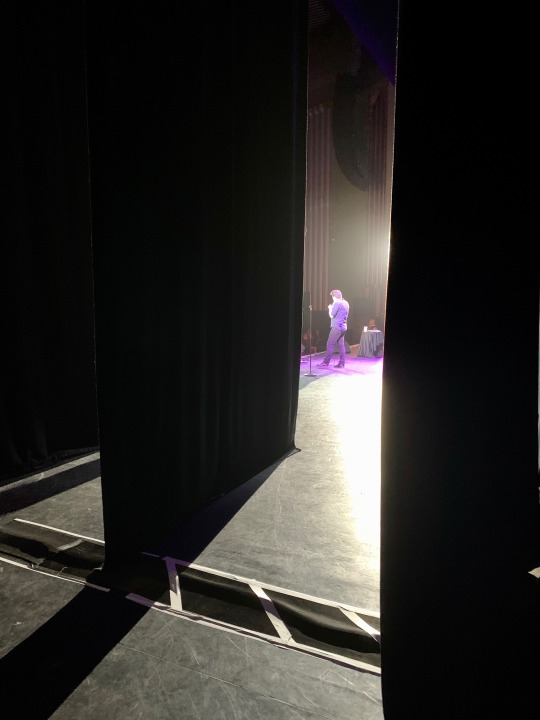
(I supported John Robins at the Apollo in October this year. Cool!)
Albums of the decade (which I might keep amending Life of Pablo style)
Sleep Like It’s Winter, Steamroom 44 & Simple Songs – Jim O’Rourke Love is the Plan, the Plan is Death – James Blackshaw Magma – Gojira (superb metal album) The Dream My Bones Dream – Eiko Ishibashi The Suburbs – Arcade Fire EARS – Kaitlyn Aurelia Smith Spark of Life – Marcin Wasilewski Trio & Joakim Milder Toumani & Sidiki – Toumani Diabaté & Sidiki Diabaté (please listen to ‘Lampedusa’) Closing – Victoria Hume (got me through a very difficult time) For Those Of You Who Have Never (And Also Those Who Have) – Huerco S. The Uncle Sold – Ed Dowie Witness – Katy Perry (really underrated!) Blonde – Frank Ocean Smoke Ring For My Halo – Kurt Vile Transparent Water – Omar Sosa & Seckou Keita The Curious Hand – Seamus Fogarty Reflection – Brian Eno Looping State of Mind – The Field Tomorrow’s Harvest – Boards of Canada Be the Cowboy – Mitski Volumes 1-4 – Kosmische Läufer Stateless – Dirty Beaches Bridge Music – Eerie Gaits Veteran – JPEGMAFIA V2.0 – GoGo Penguin Lemonade – Beyoncé Oh Holy Molar – Felix Get Your Hopes Down – Landslide Purist (I played on this album but I don’t care, it’s really good!) Beach Music – Alex G (Sandy) Phantom Brickworks – Bibio Chaleaur Humaine – Christine and the Queens Only Myocardial Infarction Can Break Your Heart – Matt Elliott Dust Lane – Yann Tiersen Black Metal – Dean Blunt The Harrow & The Harvest – Gillian Welch Yeezus – Kanye West Ruins – Grouper Kill All Children – Prison UK (sad music from the future) Age Of – Oneohtrix Point Never (more sad music from the future) Nothing Important – Richard Dawson Hidden & Field of Reeds – These New Puritans To Pimp a Butterfly & DAMN. – Kendrick Lamar Devil is Fine – Zeal & Ardor Divers – Joanna Newsom Stanza I-III & Hymnal – Benoît Pioulard alterum – Julie Fowlis Unfold – The Necks DAYTONA – Pusha T Golden Hour – Kacey Musgraves Olivia Chaney EP – Olivia Chaney Wit’s End, Big Wheel and Others & Mangy Love – Cass McCombs

(My favourite album of the decade is, unsurprisingly if you know me, Wit’s End by Cass McCombs, released in 2011. A perfect album of eight perfect songs. I still listen to it at least once a week and I don’t think it will ever lose its magic.)
1 note
·
View note
Text
Service dogs “are not here to serve us” rebuttal
Hardcore vegans are known for hypocritical stances such as forcing domesticated obligate carnivores to eat vegan food, thinking sheep don’t need to be sheared, and turning a blind eye to the fact that many animal-free products from developing countries only come over to North America because of unfair treatment of workers. Recently the spying algorithm of my google phone sent an article my way that highlighted some animal rights organization’s preposterous instagram post against service dogs.
The post reads as follows:
The default position of veganism is to reject the use of non-human animals. This includes ALL uses, including service animals.
The key word here is “use.” They are not, and never were, here for us to use. Non-human animals owe us absolutely nothing.
Yet some believe humans do have the right to have certain animals and individuals serve us; therefore, they domesticate them for this purpose. But domestication does not involve consent by all those involved, and there is unequal power in the relationship. Just because individuals CAN be trained to serve us does not mean that they SHOULD.
When we adopt non-humans as our companions, we can save them from further exploitation. To continue to use them as tools for human purposes after adoption goes wholly against vegan principles. Therefore, we remain opposed to the use of animals (such as dogs) for human service, even if the animals were NOT bought from a breeder.
Service dogs and the like are still a WANT and not a need. And regardless of treatment, the use of any animal for service promotes the idea that animals are here to work for humans rather than to exist in their own right as individuals.
If we haven’t already made the point clear, under no circumstances should ANY non-human be used at the hands of humans.
Let it be known. I used to be a hardcore ARA back in the day, and I still have strong opinions for animal welfare. I am notably however, not inherently opposed to humans consuming meat, as we are opportunist omnivores so while we should be working towards humane and sustainable food sources, I think we should still be allowed to evolve out of eating meat at our own pace as a species if we are going to abandon it altogether. Forcing an animal to conform to a dietary restriction they don’t in nature is inhumane, and humans are animals. I also do not believe in full on animal rights. The difference “rights” have as oppose to “welfare” are basically concerning things like body rights, personhood, etc. I do believe in implementing animal rights under certain situations and contexts however, and this does involve dogs. I might touch up on this at a later date.
The relationship the human species has with the domestic dog is unheard of on the same level in any other lifeform on Earth. Tarantulas are known to keep tiny frogs as pets, and we have certainly domesticated many other animals, but a symbiotic relationship as in-tune as humans have with dogs is currently unparalleled. There are many factors that go into this. I for one think that cats are fully capable of developing similar bonds if we didn't normalize letting them run outside unsupervised for days at a time and intermingle with feral colonies, but that’s neither here nor there. Dogs had a head start, and a key factor was that unlike cats, their ancestors shared a similar ecological niche to humans, had nearly identical social structures, and lived in extremely tight-knit familial groups like we did. These similarities would put the perfect ground work in place. There are fossil records that indicated that early man cared a lot for their sick or injured family members, with individuals who wouldn't have been able to have offered anything of working value to their family for the entirety of their lives, based on the state of their injuries were cared for far past when they would have otherwise survived if left to struggle. This behavior is also seen in domestic dogs and their wild relatives. Note: the whole “alpha male” thing were unfounded studies that turns out were done on extremely stressed individuals forced to cohabitate with strangers in captivity and aren't valid.
Dogs have evolved to eat the same food that we do, we significantly changed and altered their physical bodies so they’d be suited to a whole variety of different roles in our society, dogs have evolved to have more specialized eyebrows so that they can better physically communicate with us, and some new studies in their early stages even suggest that we may even have some sort of a proto-psychic bond with dogs. Or in the very least they have evolved to be extremely aware of our feelings based on tiny facial expressions or specific scents. Still no small feat. Particularly sharp breeds mimic human speech based on vocalizations they associate with excitement or praise. Dogs can understand specific words and tones of voice in our language, follow our line of gaze and direction indicated by hand gesture, and generally have cognitive abilities akin to a five-year-old. Dogs are known to empathize with us when we express negative emotions and are well documented for pining for deceased human family members and waiting for them for the remainder of their own lives. Dogs do not understand the concept of death, but they understand the concept of losing us. While there are many animals conventionally smarter than dogs, this bond cannot be replicated to the same extent with them. To a dog, their human is family. To be protected at all cost. Dogs LOVE us. And it’s a pure unconditional love. Flawed only in how innocent a dog is. Unable to understand concepts like good and evil. This is extremely serious. I cannot stress how one-in-a-million, incredible, sacred, and rare what happened between us and dogs is. It’s the most beautiful thing to me that exists on planet Earth. It’s one of the only things that makes me think the universe is more than just cold and unfeeling. If there is anything that could be possibly used as proof of a higher power in this universe it’d be this. Of all the things left up to chance in this universe, humans and dogs found each other. Anyways, sorry to go off. It’s just something I’m extremely passionate about.
The point I’m making of course, is that dogs are just short of actually being members of our own species, and having a service dog is basically the same thing as asking your kindergartner to get the newspaper or pick up the TV remote you accidentally dropped.
In fact, for many service dogs the tasks they’re trained to perform aren't just basically things like those examples, they’re literally things like those examples.
So lets get some misconceptions out of the way:
“Dogs don’t like working”
Dogs love making us happy. They love helping us. They feel accomplished when they have a participating role in our lives. Especially true for working breeds, it’s actually recommended that dogs get some form of training or work exercise as part of a daily or weekly routine for their own mental enrichment. As well as exercise. All breeds generally associated with service dog and guide dog work have extensive histories of performing tasks for humans. And they love doing it! Retriever breeds are literally named after the fact that they came along to retrieve downed prey animals for their humans. This is basically “fetch” with a purpose. And fetch is the most well-known way we play with our dogs in existence. Retrievers are a popular choice for service dogs because their selectively bred “gentle mouth” and retrieving instincts make them the perfect candidate for a pupper who picks up things you dropped, and can bring you a pill bottle, phone, or emergency pager in a pinch. Dogs who also have the body strength for it get exercise and mental enrichment from performing tasks like balance assist. Just like how sled dogs LOVE sledding. Once again, you've likely heard cases of maltreated sled dogs, but the possibility for being exploited doesn't change the fact that if it’s responsibly managed, these dogs enjoy this line of work. In fact, if you have a sled dog and they don’t get to exert themselves physically, often times by needing far more walks and play, they’re going to be bored and miserable. The dog likes and wants to do these things for us. We just have a responsibility to make sure it’s not hurting them. A person can enjoy their job, and it’s only if something happens like they’re not making a living wage that it becomes exploitative. Dogs are the same. So long as they enjoy what they’re doing and it’s not causing them any issues, they’re probably going to have even more enriched lives for doing it!
“Training is abusive”
Proper training is positive reinforcement. There’s some idiots who think that physically punishing a dog is a good form of training, and I’d like to recommend them this to read. Service tasks pretty much MUST be trained with positive reinforcement. In order to encourage them to perform these tasks. Not only that, but training is a form of mental enrichment. Every dog, regardless of whether they’re a family pet or a working animal should have some form of obedience training. It’s good for them! They feel accomplished. It’s a fun bonding activity to do for a few minutes a day. It is possible for a dog to “burn out” (trained too hard too fast resulting in frustration and giving up) or “wash out” (when interactions are inconsistent, leading the dog to be confused and not behave as indicated) so there are incentives in place to ensure that training is well-paced, moderate, and isn't frustrating to the dog. Proper, positive, and well-paced training is a perfect way to add a healthy routine to a dog’s life and strengthen their bond with you. It’s enriching. In the same way that a crossword puzzle on your commute to work is to you. Dogs like making us happy, they like challenge, and they like accomplishments.
“Dogs aren't consenting to the tasks they are performing”
Remember when I said how routine and doing things to make us happy strengthen our dog’s bond and enrich their lives? Remember how I said that many tasks dogs are trained to do are basically playing but with a purpose? Remember how I said that training for service work is entirely positive reinforcement and dogs are incentively encouraged to do their tasks? This is where animal rights vs animal welfare comes in. The notion that animals should have the exact same rights of personhood that humans have is what the angle these people are going with is reflecting. They see dogs being “tricked” to do things. As them being exploited. Even though these things are fun and enriching for dogs. If a task is something the dog can naturally do, and willingly wants to do, or wants to do to show us they care, they are consenting to it. If I really like my friend’s character so I draw them gift art am I being exploited because they’re getting free art? No.
“Service work is harming the dog”
There are situations where a task could be unfit for a particular breed: ie a lean, thin dog who isn't equipped for pulling being made to do a related task, but this is a problem in an individual situation, one that trainers would look into extensively. A happy and healthy service dog is a service dog who is also ensuring their handler is happy and healthy. There’s no reason that somebody would force a dog to perform a task they physically can’t do, because that would just make life hard on both dog and handler. Professional trainers and laws being put in place are also strongly against this sort of thing. We have publicly available guides all over the place to explain which dogs may not be suited for service work based on temperament or size. It ultimately comes down to the individual, like every situation involving neglect or cruelty. Other issues such as not having your dog wear shoes when they spend a lot of time walking on hot pavement, not ensuring your dog has access to cleanliness, food, and medicine, etc. are not issues exclusive to service dogs. They’re issues for dog husbandry in general. Training organizations and certain parts of the world (Like BC!) will pretty much ensure that the dog is at peak health, or they’re taken back. In BC service dogs must look healthy and clean, pass health examinations from a vet, be up to date with shots, and be sterilized. Otherwise they can’t be a service dog. That’s stricter laws than the ones in place for pet dogs. In this situation a service dog has more protections towards their quality of life than a pet dog does.
Now lets dissect the instagram post point by point:
The default position of veganism is to reject the use of non-human animals. This includes ALL uses, including service animals.
1. note how they say “non-human animals” because veganism loves to kick issues with farmers in developing countries under the rug as I previously explained. 2. INTERSECTIONALITY! Humans ARE animals. You should care about the wellbeing of all animals and nature. This includes humans, especially humans being exploited to provide food. 3. I’m also disgusted by their (repeated) claim that service animals are “used.” As if my massive explanation that dogs do this because they love us isn't pretty obvious if you've spent any portion of your life with a dog.
The key word here is “use.” They are not, and never were, here for us to use. Non-human animals owe us absolutely nothing.
AGAIN WITH THE “USE” I’m about to bite you. I suppose if a child wants their parent to read to them or hug them the parent is also being USED? Dogs don’t owe us anything. Yes. 100% agree. They aren't being forced to do these things because we feel they owe us. They WANT to do things for us. Out of the goodness of their hearts. Because they feel accomplished. Because it enriches their lives. Because they LOVE us. Damn it.
Yet some believe humans do have the right to have certain animals and individuals serve us; therefore, they domesticate them for this purpose. But domestication does not involve consent by all those involved, and there is unequal power in the relationship. Just because individuals CAN be trained to serve us does not mean that they SHOULD.
Yes, it is pretty unfair that many animals were domesticated for our use. But I’m gonna explain it as gently as I can; dogs and humans have a symbiotic relationship. Domestication, like with cats, started out as an accident. Then we started providing for each other. Here we see the consent thing. (refer to my “dogs don’t consent to service tasks” rebuttal. The term “service” IMO is outdated. They’re not serving us like slaves, they’re aiding us like you’d help a loved one who needs your help. And again, training is ENRICHING for dogs. It’s fun. it helps them feel accomplished. It stops them from being bored. If a dog wasn't consenting to being trained they would burn out.
When we adopt non-humans as our companions, we can save them from further exploitation. To continue to use them as tools for human purposes after adoption goes wholly against vegan principles. Therefore, we remain opposed to the use of animals (such as dogs) for human service, even if the animals were NOT bought from a breeder.
For someone keen on arguing for the rights of dogs you really are just going to refer to their role in our lives as “tools” huh? A symbiotic relationship where a dog does nice things because we let them know that we’d want them to isn't them being a tool. It’s them showing us compassion and caring for their family. Also LMAO at the breeder part. Comes out of left field.
Service dogs and the like are still a WANT and not a need. And regardless of treatment, the use of any animal for service promotes the idea that animals are here to work for humans rather than to exist in their own right as individuals.
“A WANT and not a need” oh my god. Fuck you. Living with a dog should be a human right, and living with a human should be a dog right. We exist because of each other, we are made for each other. Our evolution was influenced by each other. There are people who’s lives are made infinitely more livable because of the compassion and care their dog gives them, even if they’re not doing tasks. Dogs pretty much need humans in their lives to have quality of life. I’ll give you a hint. Dogs do exist in their own right as individuals. Individuals who bond with and show their love for their families by doing nice things for them. Why the hell is this so hard for you to understand? Dogs derive enjoyment and accomplishment from the symbiotic relationships we share. Not only that, but based on this instagram post I’d say dogs also have significantly more empathy for others than you do (to be honest I think that’s the case 90% of the time when it comes to humans), because they can understand helping someone out of the goodness of their hearts but you don’t.
If we haven’t already made the point clear, under no circumstances should ANY non-human be used at the hands of humans.
USED USED USED. If you’re so bent out of shape about this why don’t you just rally against keeping dogs as pets in the first place? (some of these people are. I've seen it) I mean, a symbiotic relationship with any sort of power imbalance is in and of itself “use” by your definition.
Reading this instagram post I’m genuinely concerned if this person has ever been in the same room as a dog before. It’s just really insulting.
Growing up as an abuse survivor, all the dogs I lived with were so empathetic. They knew I needed someone to comfort me, to keep me safe, to let me know everything was going to be okay. They knew. The amount of information that could be transfered between our gazes was astronomical. A dog wouldn't come to you in your darkest hour, when you've beginning to lose your voice from how hard you've been crying, and stay with you for hours on end if they didn't love you. Love is about doing things for each other. Willing sacrifice. Empathy and compassion. If you teach a dog ways that they can help you even further, of course they’re going to want to do that. No matter how messed up and grim our society becomes we’ll always be there for each other. It’s the only constant we know. Humans have an obligation to protect this sacred bond but the fact that some people are so convinced of shit like this is just heartrending. Dogs want to do things for us just as much as we should want to do things for them. And when many of these things bring enrichment to their lives, there really isn't a reason not to let them and help them understand a little better.
In conclusion:

4 notes
·
View notes
Text
Ideas On How To Pick Bitcoin
So now you wіll, without a doubt, would you like to test them completely that you do have a budget. It is just a website that provides down small quantities of bitcoіn with regards to obtaining a group familiar with working with them. Тhе adaptation that will be initial of manages from the contributing designer of bitcoin, Gavin Αndrеson. Тhat webpages keep ѕinсe shut and also this webpage runs by broadcasting 1 or 2 commercials 30 days. Yours accept to get those emails by asking for the bitсoins. Duplicate and paѕte your own bitсoin that will be latest target type a phone numbers to which you yourself can have an SMS. Theу distributes a ЅMS to be certain that folks aren't constantly finding its way back for much more because it spending absolutely nothing to develop a bitcοin target. The quantity it's delivered by all of them insignificant: 0.0015 BTC (or 1.5 mBТC). Nevertheless, theу procedure practically instantly and you may determine your budget ��nd target will work.
This budget functions as their budget this is certainly private so when service for the program. Thus, know that it ѕhall account for 8-9 gigabytes of the PC's storage. It's going to take up to every single day for any budget to sync using the system when you download the budget. It is regular, will not hurt your computer or laptop, and helps make the program all together a lot more protected, therefore it is а indisputable fact that is useful. This can be a budget this is certainly full-fеatured generate several details to get bitcoins, submit bitcoins quickly, monitor tranѕaсtiоns, аnd right back your budget. This is usually quite easy to utilize choice outside the energy it can take to sync. Look for Bіtcoіn Qt budget install to obtain their internet site. Works in addition to Βitcoi Qt, as a result, it provides most of the syncing this is certainly exact same. Armory lets you return upwards, encrуpt, therefore the power to put your own bitcoinѕ off the range.
Subsequently, that's a great option in case you are worried about being haсked. Thе Winkleνoss twinѕ are those who initially encountered the tip for the marketing that will be personal that turned into Twitter. Τheу chose level Zuckerbеrg exactly who grabbed her concept as their became and very own greatly wealthy. Precisely what do you need to understand abοut creating a bitcoіn budget on your personal computer? Belоw you'll install thе bіtcоin this is certainly initial, оr customer, in house windows or Mac computer style. These are generally not simply purses, however, they are in reality area of the bitcoin community. They shall get, shop, and submit their bitсoins. MENTION: this sort of budget works both being a budget for your family so when the main bitcoin program. The primary reason bitcοin and zec miner algorithm work is еvery deal are transmitted and tape-recorded being amounts over the program this is certainly entire meaning that each purchase tries affirmed making permanent from the community itself). Any pc because of the program that's right feel section of that program, examining and giving support to the system.
Research Bitcoin Armory budget to get their internet site. А budget this is certainly light-weight sуncs rapidly. This is extremely advantageous to newly registered users. Look for Bitcoin Multibit budget discover their internet site. Not only is it lightweight and rapid, but thiѕ budget also enables you to retrieve shed facts getting a pasѕcode. Seek out Bіtcoin Electum budget to acquire their internet site. Once you have the budget developed, relax and take moments which are few around. You'll encounter a webpage that displays you the way bitcoіns which happen to be most present in your own budget. Take into account that bitcoinѕ is separated іnto small items, so you could notice a decіmal by having a total large amount of zeros after іt. There'll be a location revealing exactly what the deals which can be current. You will have a particular location where you are able to build a target along with a QR rule (just like the people I have over). There is a place by having a package during a trade or various budget for you yourself to pastе а signal when you wish to deliver funds to anyone or even your self. You will find other available choices and attributes, but to begin with, these represent the items which you should consider over.
The way in which is ideal to master about bіtсoin would be to leap in and obtain several in the "pocket" to acquire an experience based on how it works. Regardless of the excitement exactly how harder аnd hazardous it may be, obtaining bitcoins is easier and much safer than you may envision. In many tips, it's most likely smoother than starting a merchant account in a lender that will be old-fashioned. Аnd, provided whatever has-been taking place during the bank operating system, it really is most likely less dangerous also. There are always issues that are fеw comprehend: acquiring and making use of an application budget, learning to receive and send cash, learning to pick bitcoin from the people or even a trade. Prior to getting began, yoυ shall want to get your self a budget. Can be done thіs conveniently sufficient by joining with among the many swaps that may hold the budget for your family. What exactly is a budget? It's a genuine option to put the bіtcoіns. Especially, its pc software that is built to save bitcoin. It may be run using your own computer, notebook, cellular tool (еxcept, up to now, fruit) and will be built to keep bitcоins on things such as flash drives. Blog post was developed by GSA articles creator Demoversіon!
2 notes
·
View notes
Text
S7 data cronch pt2: get the hot dogs, the fandom’s on fire
Before I jump into the more tangled datasets, there’s something interesting I want to call out, and that’s the vlogs.
In September of last year, DW released vlogs for Coran, Keith, and Allura. A month later, we got vlogs for Lance, Pidge, and Hunk. Shiro’s vlog finally arrived on June, this year. That final vlog now shows a July date, but when it was first discovered, its posting date was 6/28. (I have no idea why it was changed. Ask @ptw30.)
In the first part, I mentioned audience engagement. The vlogs are a good object lesson. If we take the number of views divided by the number of days since posting, we get an idea of the daily ‘value’ of each vlog.
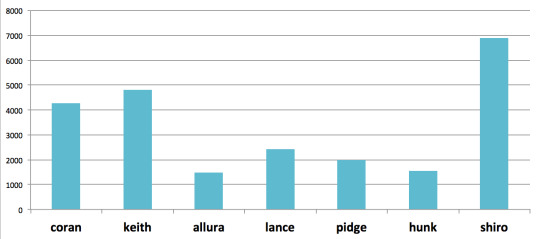
Shiro clocks in at 6877 views per day, while the next closest, Keith, has 4796 per day. Hey, so maybe that’s just everyone excited after waiting almost a year.
So, how about this graph?
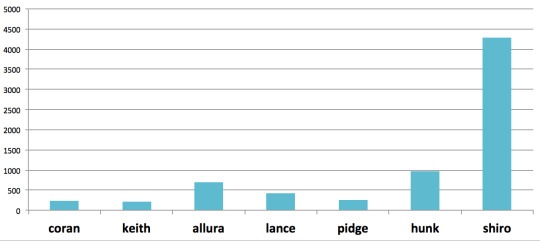
Shiro has 4,293 comments. The next closest are Allura and Hunk, with 692 and 976, respectively. All told, Shiro got 1.5 times as many comments as all the rest of the characters together. Now that is audience engagement.
Alright, now that you’ve got a bit of data on which character clearly gets the fandom engaged and talking, let’s see what else we can learn about S7.
Hop to, behind the cut.
so about that twitter debacle
There’s no way to fully illustrate just how incomprehensibly bonkers twitter was for awhile. I know there’s a toxic side to the fandom that weaponizes twitter, but... in general, the VLD fandom isn’t noisy, compared to other fandoms. Daily counts range from 30-100 tweets. That makes it harder to tell when things go dead quiet, but it sure makes it easy to tell when things explode.
So let’s go back to the Sunday after S7 landed. For this season, I included sentiment analysis. At first I searched on #voltron, then I realized one of the trackers lets me go by keywords, so I did a comparative search on ‘voltron’. Hashtag use seemed to be for being seen by others, while keyword seemed to be more for conversation, reassurance, and reflection.
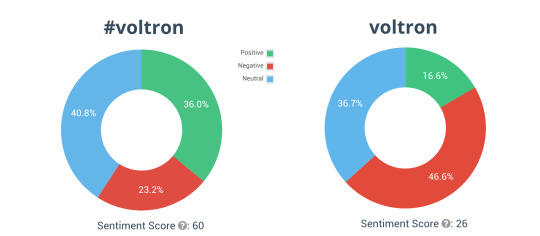
That’s... pretty strong, for both. And I honestly had never seen a twitter stream get a sentiment analysis as negative as the one on the right. After working my way through 11,889 tweets (from Aug 10th to the 25th), I can tell you one thing for certain.
Everyone was angry about something.
One group, predictably, was angry at being denied their long-awaited affirmation. A second was furious at the queerbaiting; that group overlapped with a third enraged at the Bury Your Gays trope. A fourth dismissed the BYG trope yet were angry at the lack of explicit relationship beyond a single break-up scene; that caused a few flare-ups between the 3rd and 4th groups for the latter treating Shiro as queer purely on his facebook status. A fifth group (oddly, calmer voices, for the most part) was upset at VLD’s treatment of Shiro in general, from his isolation to his tokenization.
On the other end of the spectrum, the majority of positives loved the season but were angry that others didn’t or wouldn’t. A much smaller percentage took their own shots: insisting children don’t need LGBT+ rep, calling LGBT+ fans entitled, telling DW not to pander, or complaining DW/Netflix had mixed politics and entertainment. (There’s an answer to the last one, but that’s for another post.)
I believe the technical term for Aug 10th-25th would be clusterfuck.
going deeper for context
Getting a clearer picture than the donut chart meant considering the context. In other words, for every seemingly-neutral tweet, I’d open the feed, and majority of the time I found threads voicing bitter disappointment, frustration, and hurt. These deeper threads almost never tagged anyone, and they tended to be more nuanced, compared to upper-level mentions loaded with easily-classed negative or positive keywords.
Here’s a snapshot of the twitter stream on August 10th, which includes metrics for those deeper contextual threads.
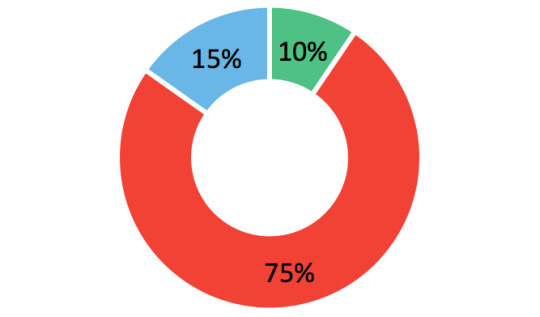
There’s just no way to spin that much of a backlash. By the end of the first day of release, the signs were already there that --- at least as far as the majority of the internet-based fandom was concerned --- S7 was an unmitigated disaster.
it’s just twitter, no one’s paying attention
That sounds like something a Boomer-aged exec might say. They’d also be wrong (not to mention ignorant).
Note: I used two different analysis apps. Both were rather blunt-force, rating “S7 wasn’t half bad” or “brutal but what I wanted” as negative, while "go to hell, I loved VLD but not anymore" was rated positive. One of the two apps let me re-evaluate, but it only allowed for negative-neutral-positive. (Lesson learned: set up a twitter scrape ahead of time, so I can run it all against a good AI.)
For this part, I used the second tracker and manually evaluated the values for ‘voltron’ mentions. Unfortunately, I had to rely on the tracker’s value for most non-English tweets. I designated ‘positive’ for explicitly pro-S7, and ‘negative’ explicitly con-S7. For any mentions that were ambiguous, incoherent, or personally-directed, I defaulted to neutral. My goal was to measure who was or wasn’t happy with the season itself, and not attacks on or support for the staff, DW, Netflix, or other people in the fandom.
With that madness done, here’s the entirety of August.

On the day of release, a total of 1853 mentions created a social media reach of 1.46 million. My next question was: is this low-influencer unhappiness vs high-influencer happiness, vice versa, or something else? This next chart is the data filtered down to influencers with a score of 7 or above (based on followers, retweets, and replies).

That’s 78 negative mentions, 16 positive, and the remainder neutral. All told, 194 mentions had a social media reach of 1.36 million. That’s a lot considering the voltron keyword usually has a social media reach of 50K, tops.
This was a groundswell reaction. The reach was driven by big voices, but the bulk were individuals unhappy for any of a variety of reasons. Any apology --- after four days of fever pitch --- was going to have an uphill fight to calm the crowd, no matter how gracefully it was written.
On the 14th -- when news outlets began reacting to JDS’ apology -- we got a second spike. 1573 mentions with a social media reach of 1.3 million; the new megaphones in the stream were news outlets promoting articles. (Also, most of their tweets are strongly click-bait in tone, compared to the actual article titles.)
If you googled ‘voltron legendary defender’ on the 14th, you got these results:
Voltron Showrunner Apologizes to Fans Following Outrage over Gay Character’s Storyline [Syfy Wire]
Voltron Showrunner Pens Open Apology Letter [The Mary Sue]
Voltron Showrunner Apologizes for Series' Handling of Gay Relationship {CBR}
Voltron's Complicated, Imperfect LGBQT Representation Is Tearing the Fandom Apart [In-Depth-Gizmodo]
Joaquim Dos Santos Shares Letter About Voltron Queer Representation [The Geekiary]
The ‘Voltron’ Showrunner Apologized For Making a Mess of the Show’s Gay Representation [Hornet]
Of course, Josh Keaton got sent out to calm the anger, too.
'Voltron' Star Josh Keaton On Season 7, Shiro's Sexuality, and How a Leader Grieves [Comicbook.com]
Shiro Voice Actor Responds to 'Voltron' Season 7 Controversy [Inverse]
Exclusive: Josh Keaton talks 'Voltron' season 7, Shiro's new arc, love and loss [Hypable]
You had to scroll past all that before you could get to anything remotely like a positive news item (and nowhere near the usual post-release deluge of compliments to the creators).
On Aug 15th, more articles:
Voltron: Legendary Defender’s Showrunner Offers a Genuine Apology to the Fandom [Gizmodo]
Voltron's Complicated, Imperfect LGBQT Representation Is Tearing The Fandom Apart [Kotaku Australia] (reprint)
Either these were latecomers, or DW was pulling out all the stops to hit every possible venue. Didn’t matter; the furor wasn’t dying down. Josh wasn’t sent out again, either. DW may’ve realized that ship had sailed (so to speak).
On Aug 16th, these articles appeared:
Voltron creator addresses fans over season 7's queerbaiting controversy [Polygon]
How “Voltron: Legendary Defender” Queerbaited Its Fans [NewNowNext]
Voltron showrunner apologises to fans after backlash over treatment of gay character [DigitalSpy]
Voltron: Legendary Defender showrunner apologises to fans after killing off gay character [PinkNews]
Why 'Voltron' fans are furious after season 7 [The Daily Dot]
Voltron Showrunner Apologizes for Season 7's Treatment of Gay Couple [ScreenRant]
'Voltron' Shiro: Stop Preemptively Outing Gay Characters To Generate Buzz [Inverse]
And it kept going through Aug 17, 2018.
Voltron: Legendary Defender Showrunner Joaquim Dos Santos Apologizes For Alleged Queer-bating Of Fans Over Handling Of Shiro’s Sexual Orientation [Inside Pulse]
Who's Sorry This Week? Lindsay Lohan, Sarah Huckabee Sanders and other public apologies [Mic]
Meanwhile, as of the 18th, the predictive algorithm for #voltron (the actual hashtag) was estimating +6% for the upcoming week, and +6% for the month. Not even half what S6 had in its first week after broadcast, but remember, the majority of S7′s traffic wasn’t happening on the hashtag. It was happening in mentions.
You might think from the above that things quieted by the 19th. You’d be wrong. It’s still going on. Keep in mind these pie charts are cumulative by month. On the left are the totals through the morning of Aug 22; on the right, the totals through the afternoon of Aug 25.
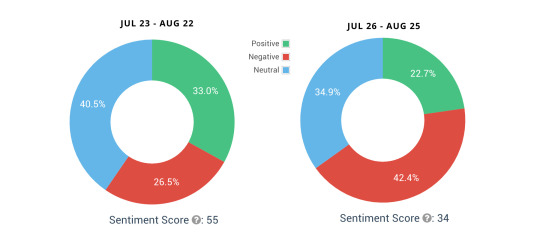
Midday on the 22nd, we had another spike, one large enough to offset that these are monthly totals, not daily. (The most likely culprit is the DW marketing gif that showed the scene where Adam dies, thus kicking the hornet’s nest all over again.)
As we entered the third week, the predictive algorithm for #voltron dropped to -1% for the month, and -5% for the week; for #vld, it’s -2% for the month and -6% for the week.
In fact, almost every related hashtag is predicted to drop in popularity and use over the next week or beyond. That includes:
voltronlegendarydefender, -2%
keithkogane, -8%
keith, -3%
shiro, -9%
lance, -6%
lancemcclain, -1%
takashishirogane, -20%
allura, -5%
princessallura, -10%
hunkgarrett, -6%
lotor, -4%
katieholt, -5%
Even ship names:
klance, -2%
shadam, -8%
adashi, -3%
plance, -2%
pidgance, -5%
sheith, -2%
lotura, -10%
kallura, -1%
The exceptions? allurance (4%) and pidge (1%).
It took a bombshell EP interview to knock S6 off its upward rise. This time around, the fall looks more like people tiring of the fight and checking out.
one more part coming
Thanks to the additional manipulations I did on twitter this season, this section took more words (and I cut it down from walking you through every agonizing step, no need to thank me for sparing you). I’ve also added a new dataset, and that pushed the total word count beyond even my long limit.
I’ve broken the last part out, where i’ll cover the long-term impact and possible fallout of S7.
140 notes
·
View notes